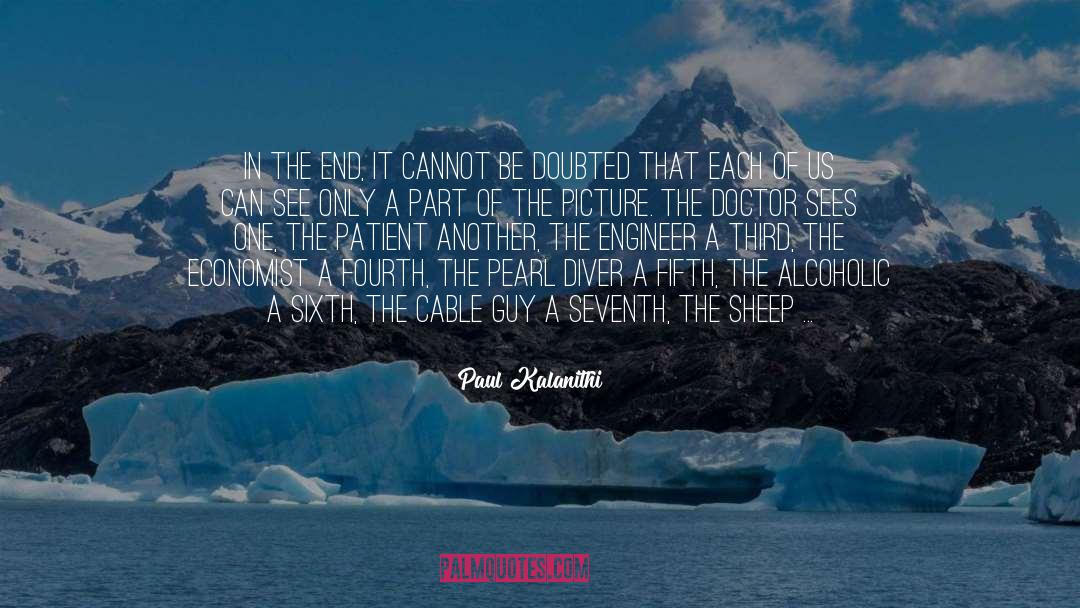Paul Kalanithi Famous Quotes
Reading Paul Kalanithi quotes, download and share images of famous quotes by Paul Kalanithi. Righ click to see or save pictures of Paul Kalanithi quotes that you can use as your wallpaper for free.
Indeed, this is how 99 percent of people select their jobs: pay, work environment, hours. But that's the point. Putting lifestyle first is how you find a job - not a calling.) As
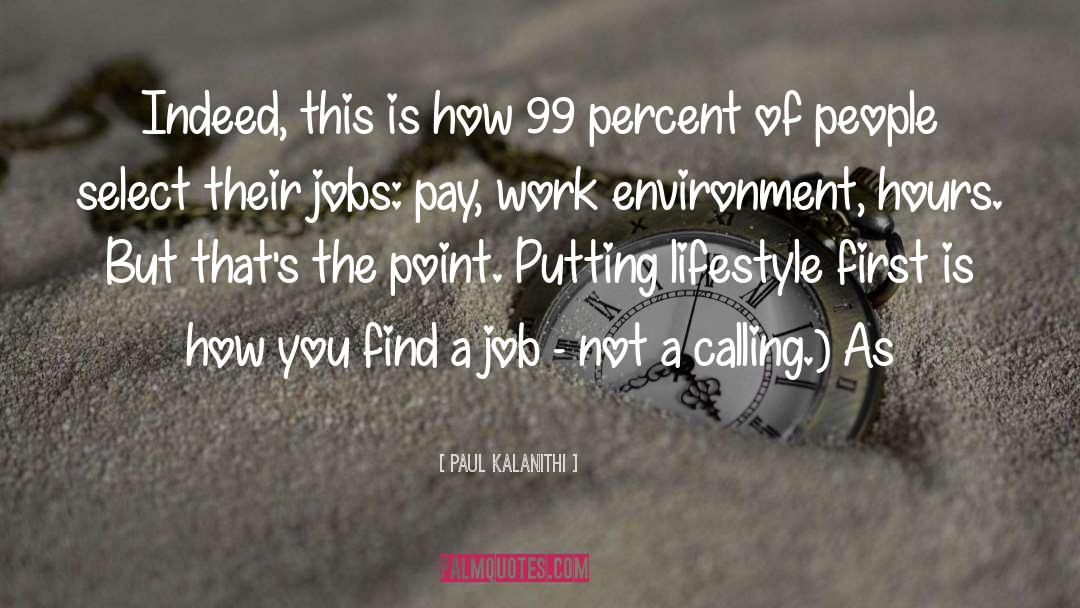
What makes human life meaningful? I still felt literature provided the best account of the life of the mind, while neuroscience laid down the most elegant rules of the brain.
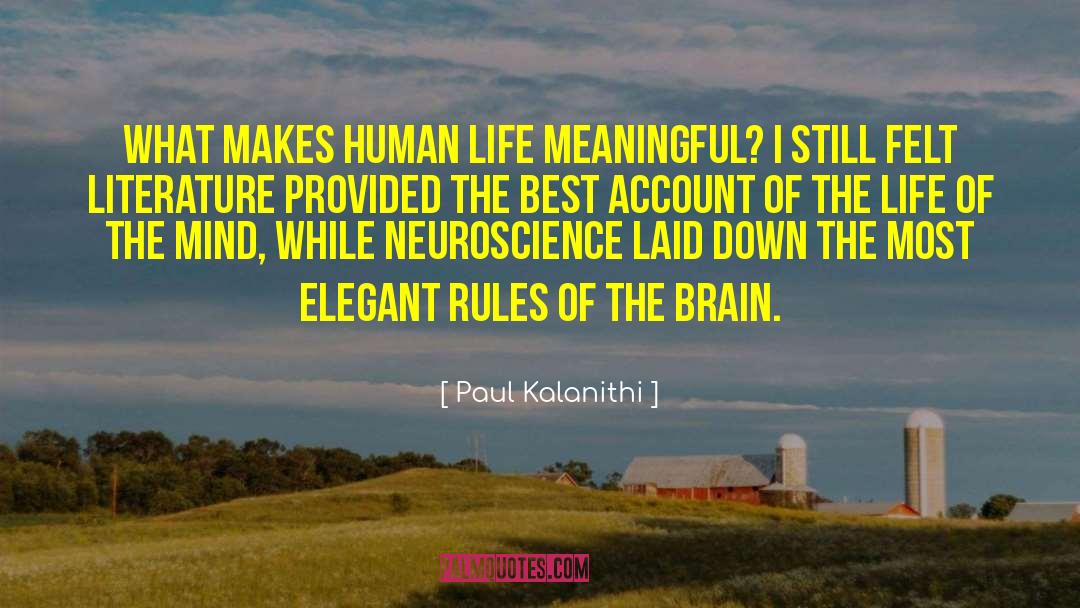
But my focus would have to be on my imminent role, intimately involved with the when and how of death - the grave digger with the forceps. Not
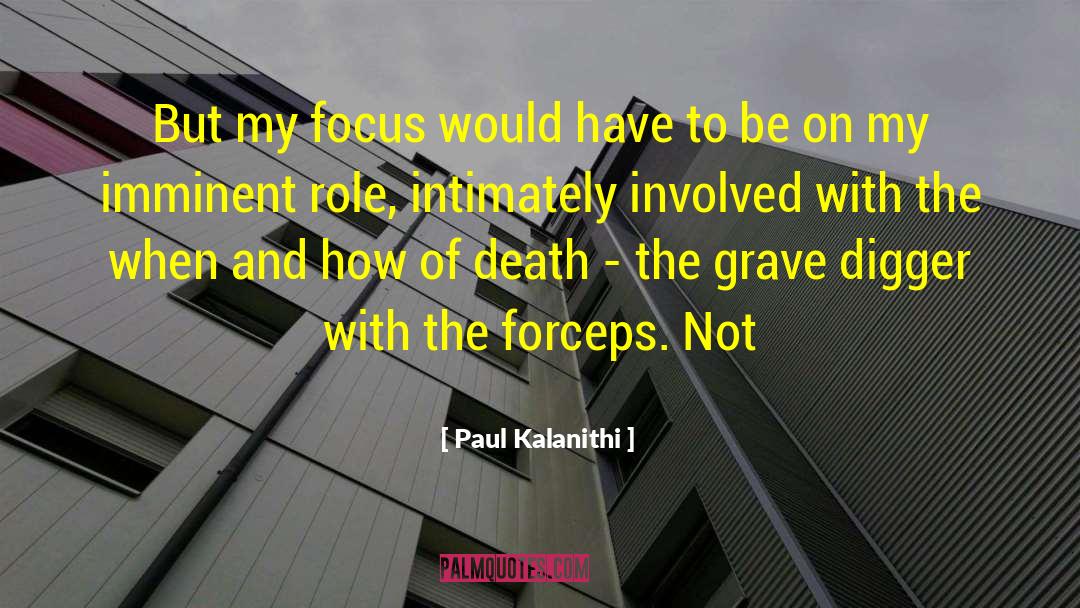
If time dilates when one moves at high speeds, does it contract when one moves barely at all? It must: the days have shortened considerably.
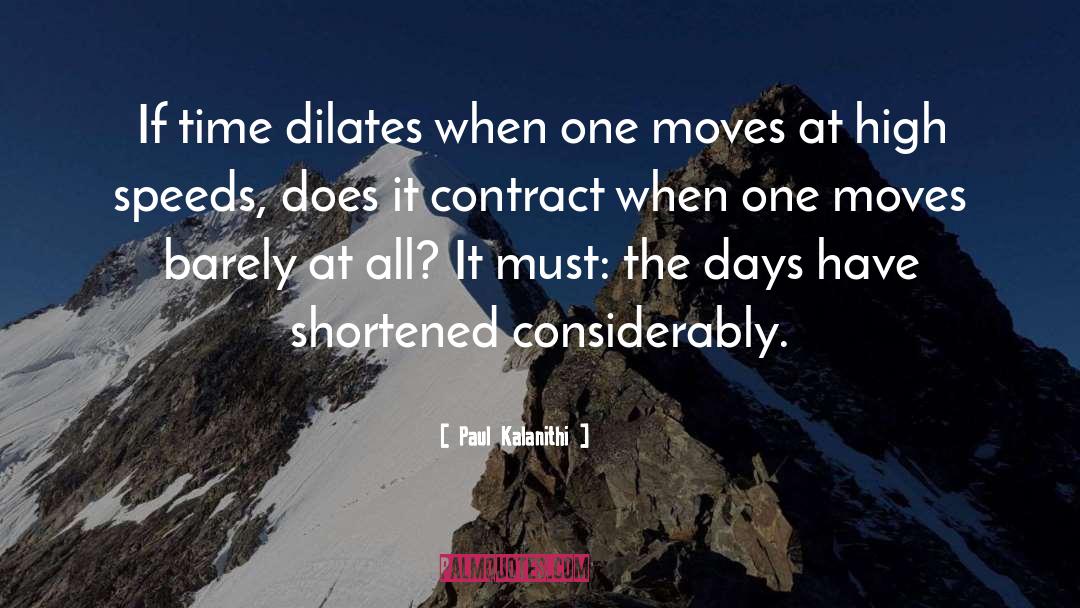
knowledge is never contained in one person. It grows from the relationships we create between each other and the world, and still it is never complete. And
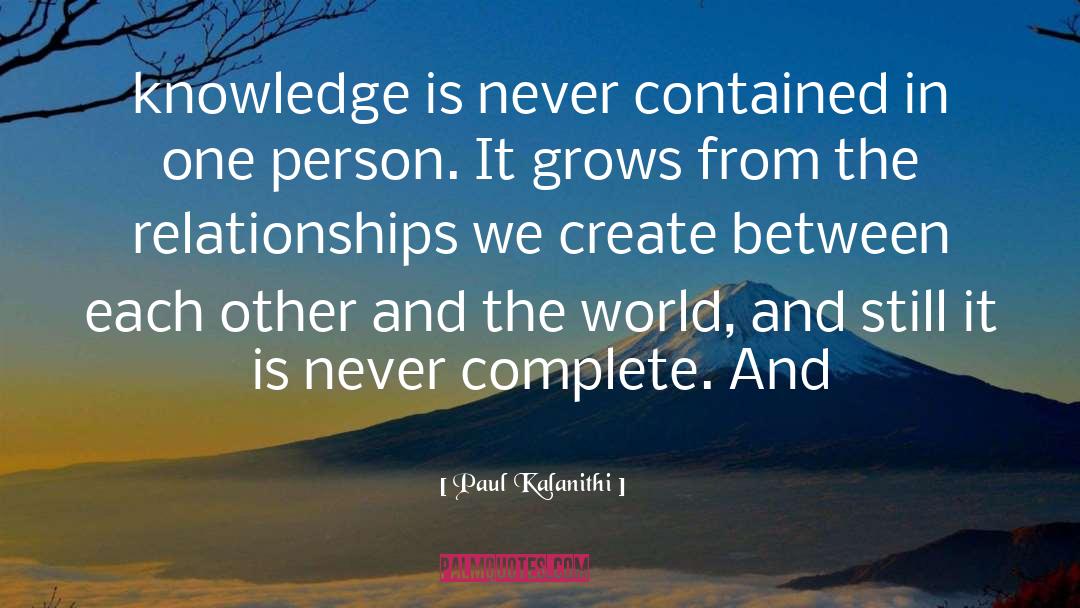
It's very easy to be number one; find the guy who is number one, and score one point higher than he does.
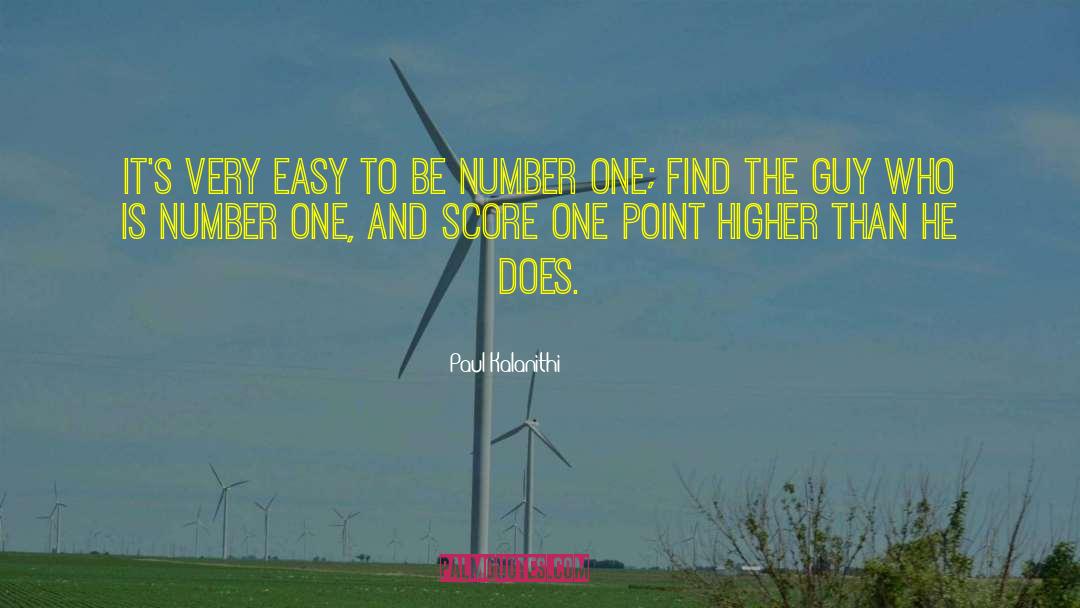
The word hope first appeared in English about a thousand years ago, denoting some combination of confidence and desire. But
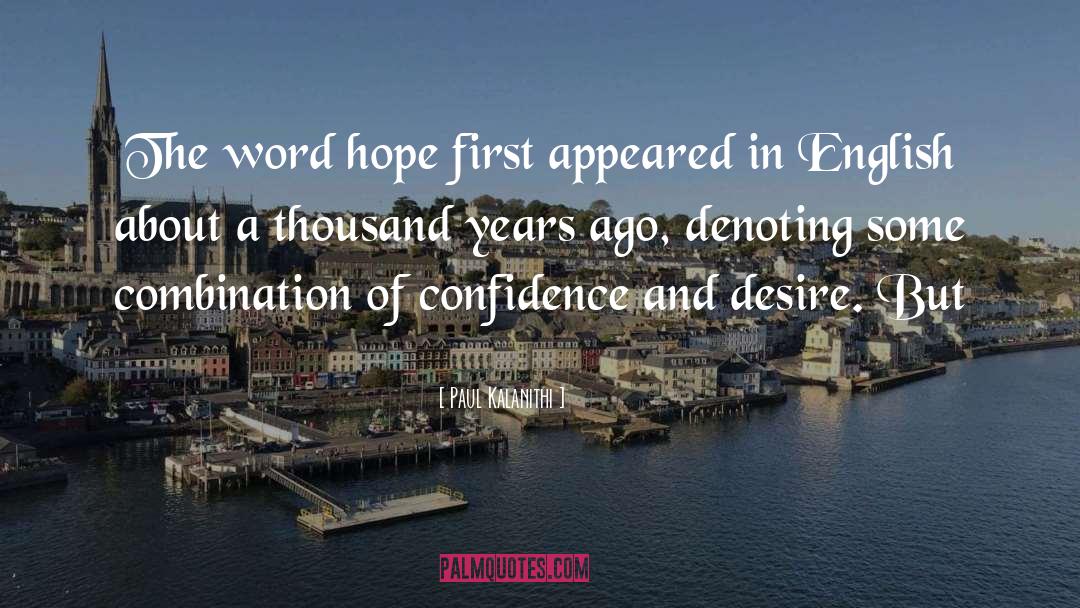
Suffering can make us callous to the obvious suffering of another.
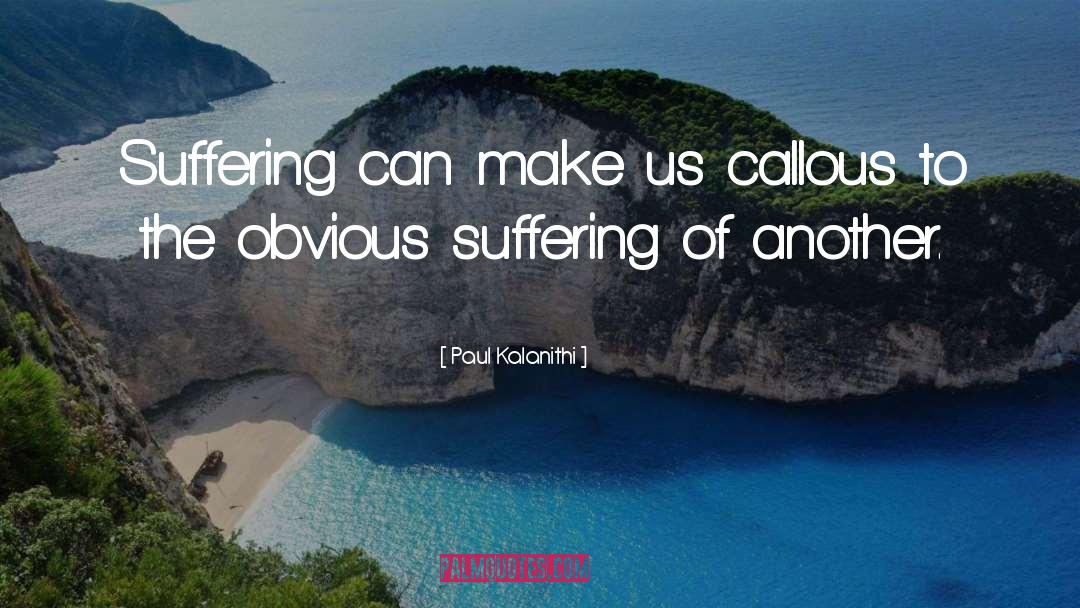
my imagined future and my personal identity collapsed, and I faced the same existential quandaries my patients faced.
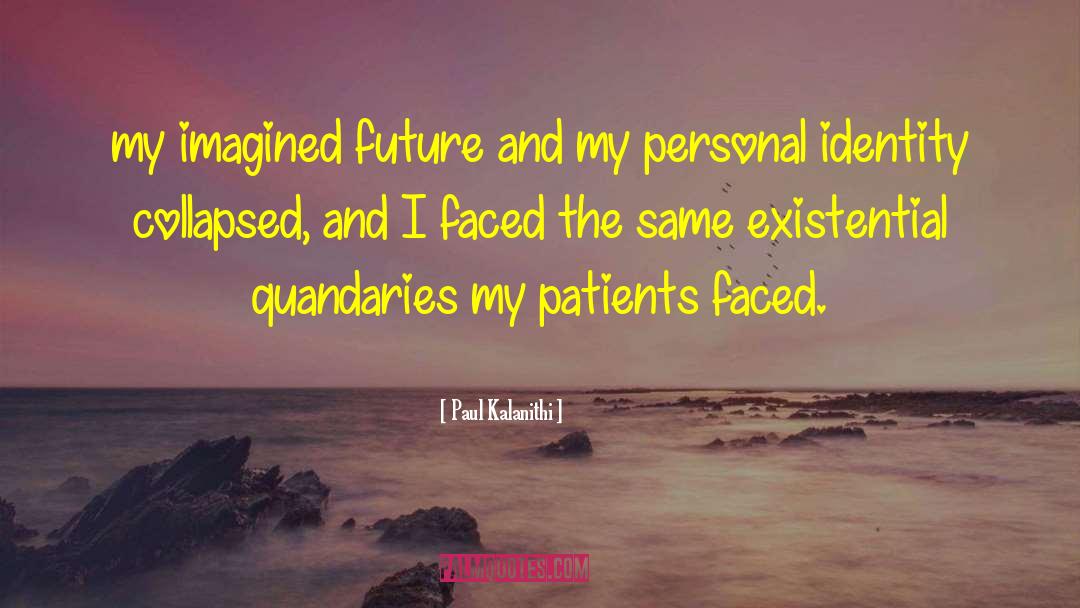
Time for me is now double-edged: every day brings me further from the low of my last relapse but closer to the next recurrence - and, eventually, death. Perhaps later than I think, but certainly sooner than I desire.
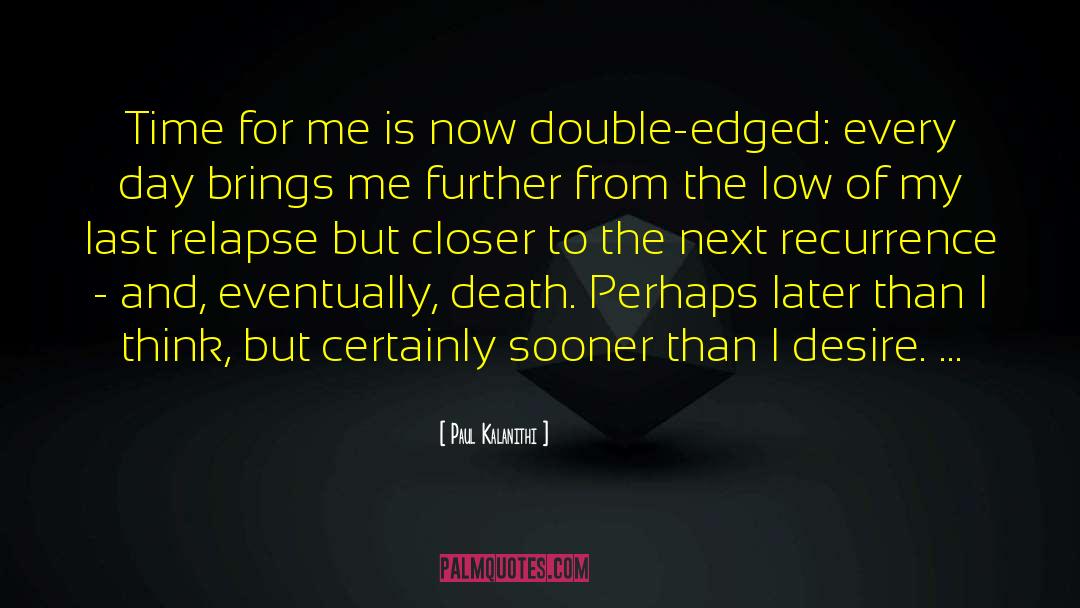
She was upset because I'd promised her one life, and given her another.
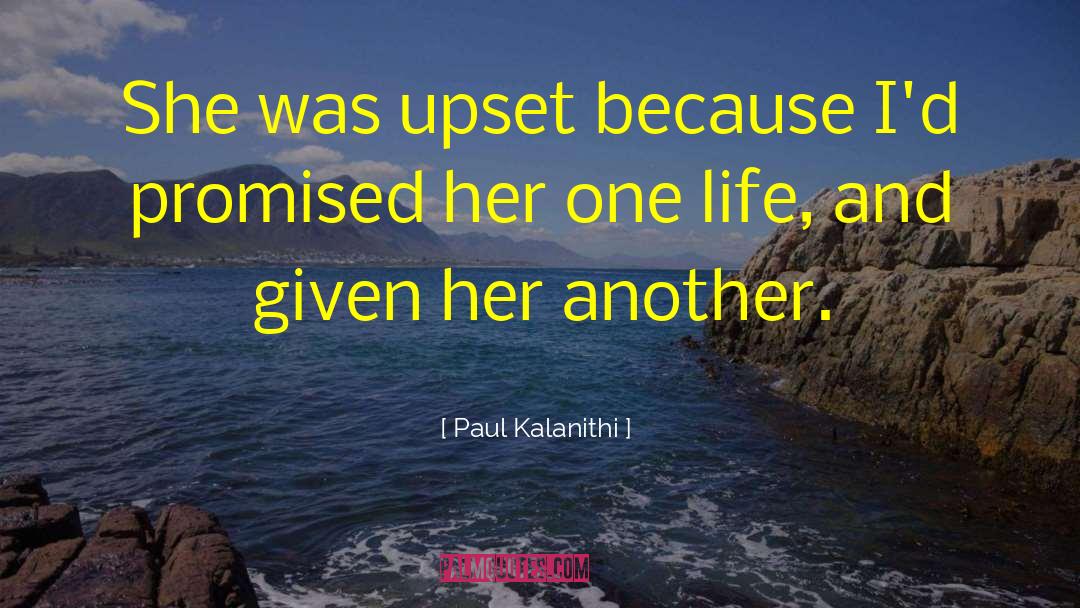
Severe illness wasn't life-altering, it was life-shattering. It felt less like an epiphany - a piercing burst of light, illuminating What Really Matters - and more like someone had just firebombed the path forward.
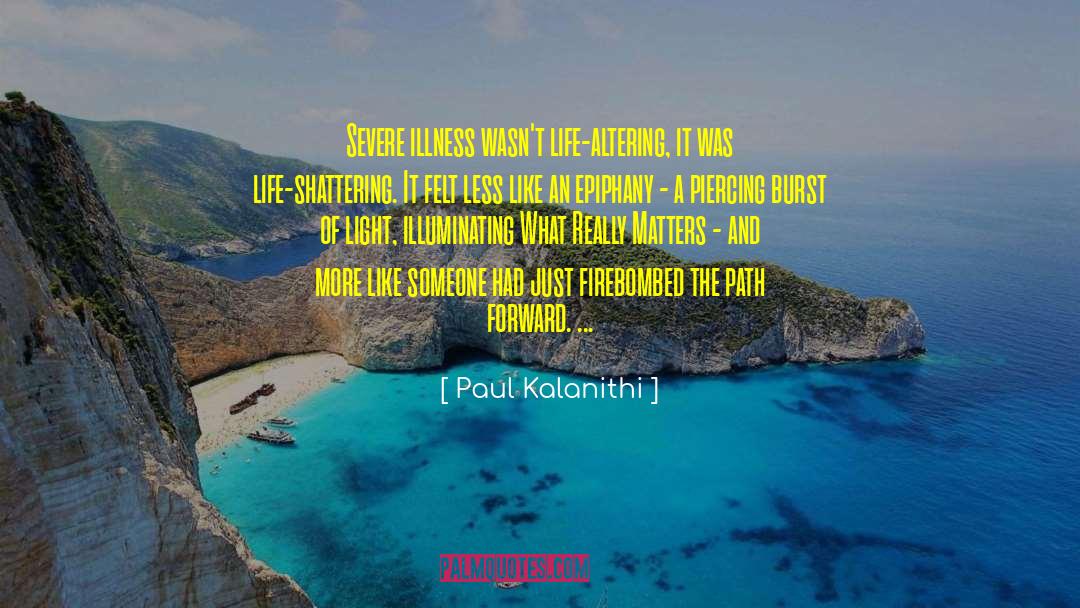
Human knowledge is never contained in one person. It grows from the relationships we create between each other and the world, and still it is never complete.
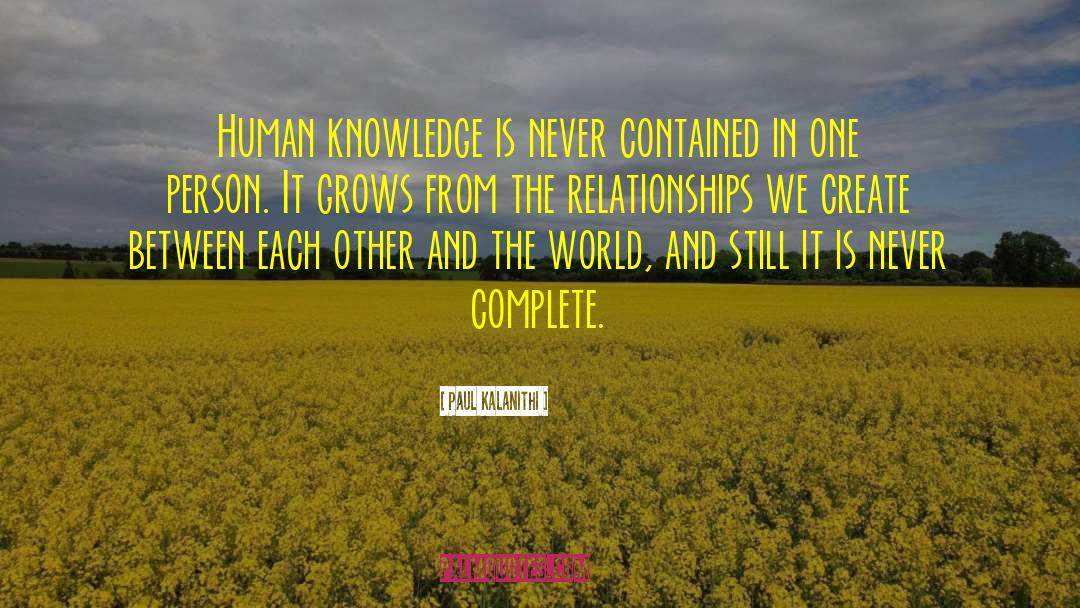
I was making the decision to do this work because this work, to me, was a sacred thing.) Lucy
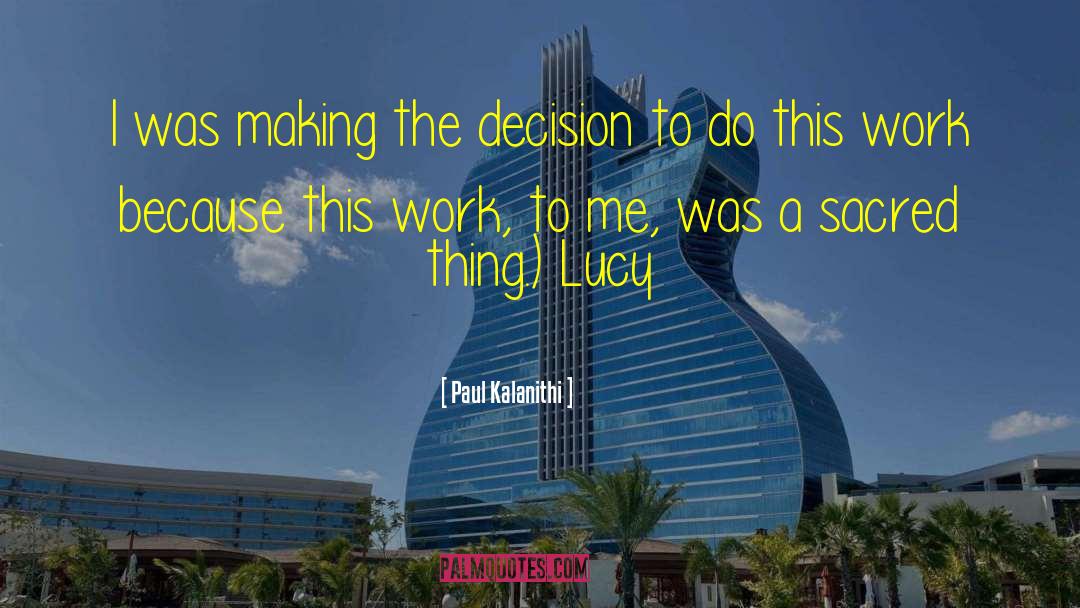
Anatomy lab, in the end, becomes less a violation of the sacred and more something that interferes with happy hour, and that realization discomfits. In our rare reflective moments, we were all silently apologizing to our cadavers, not because we sensed the transgression but because we did not.
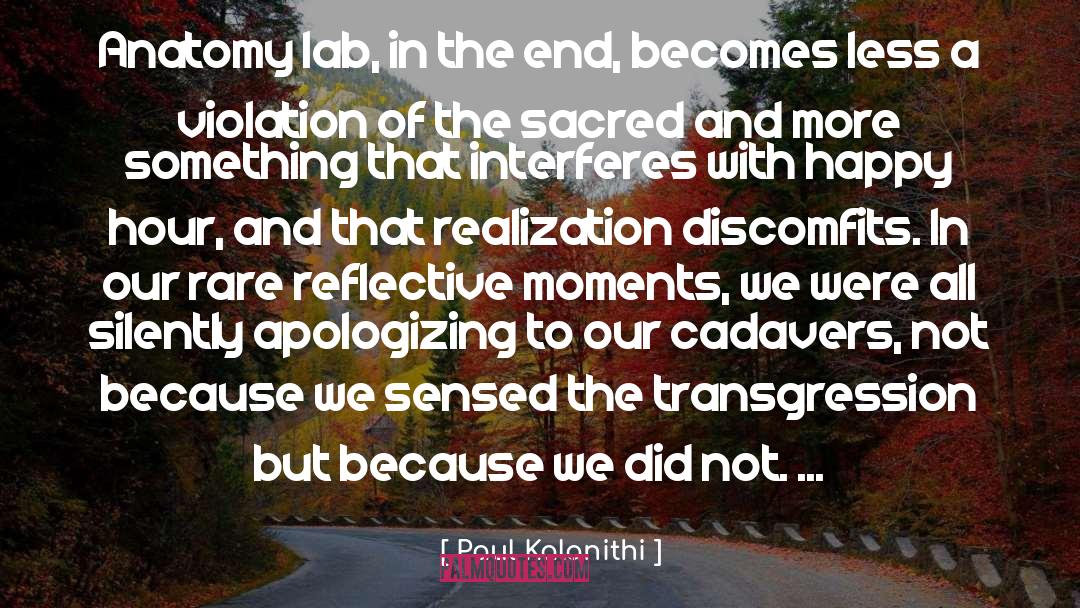
The problem, however, eventually became evident: to make science the arbiter of metaphysics is to banish not only God from the world but also love, hate, meaning - to consider a world that is self-evidently not the world we live in. That's not to say that if you believe in meaning, you must also believe in God. It is to say, though, that if you believe that science provides no basis for God, then you are almost obligated to conclude that science provides no basis for meaning and, therefore, life itself doesn't have any. In other words, existential claims have no weight; all knowledge is scientific knowledge. Yet
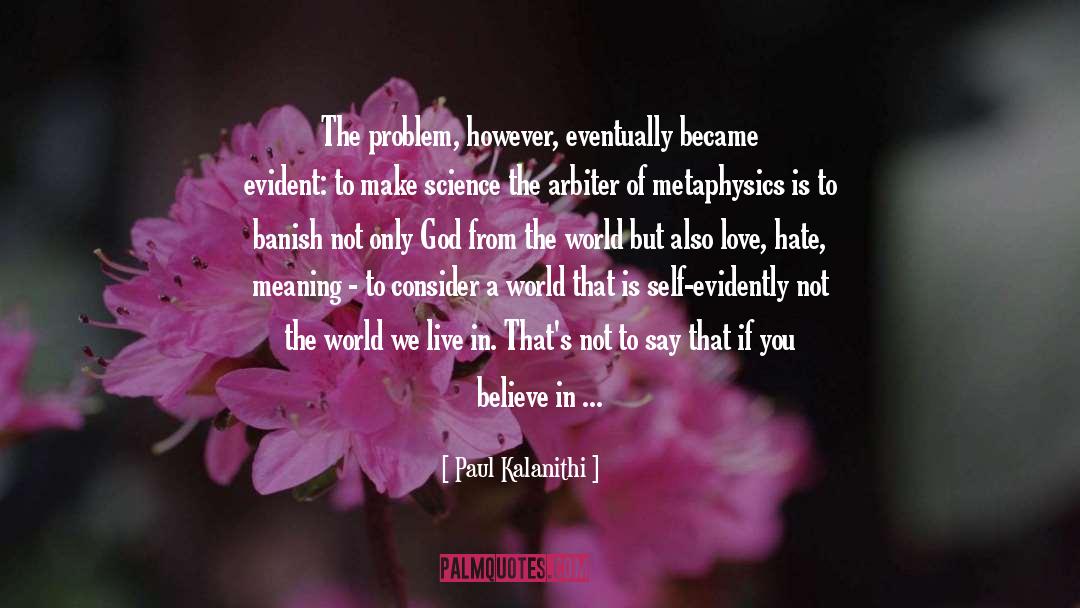
I had traversed the line from doctor to patient, from actor to acted upon, from subject to direct object.
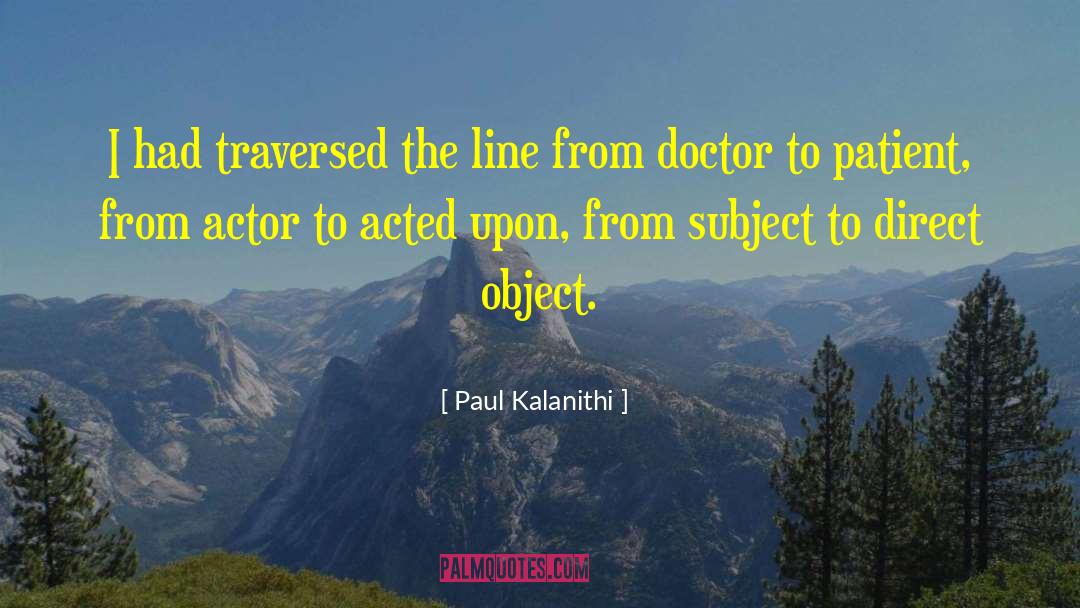
Everything teeters between pathos and bathos: here you are, violating society's most fundamental taboos and yet formaldehyde is a powerful appetite stimulant, so you also crave a burrito.
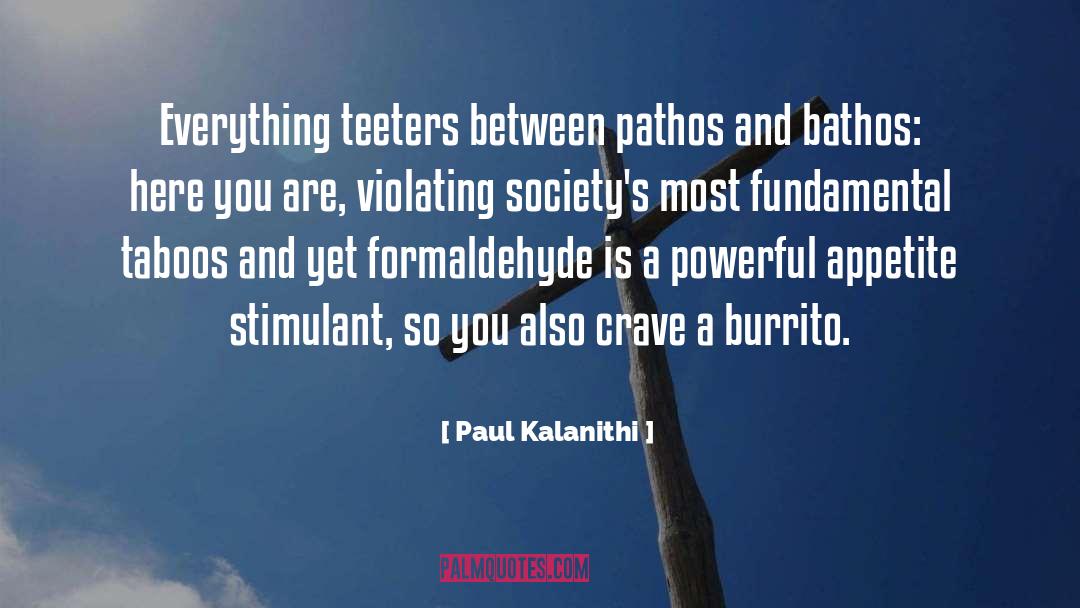
Medical training is relentlessly future-oriented, all about delayed gratification; you're always thinking about what you'll be doing five years down the line.
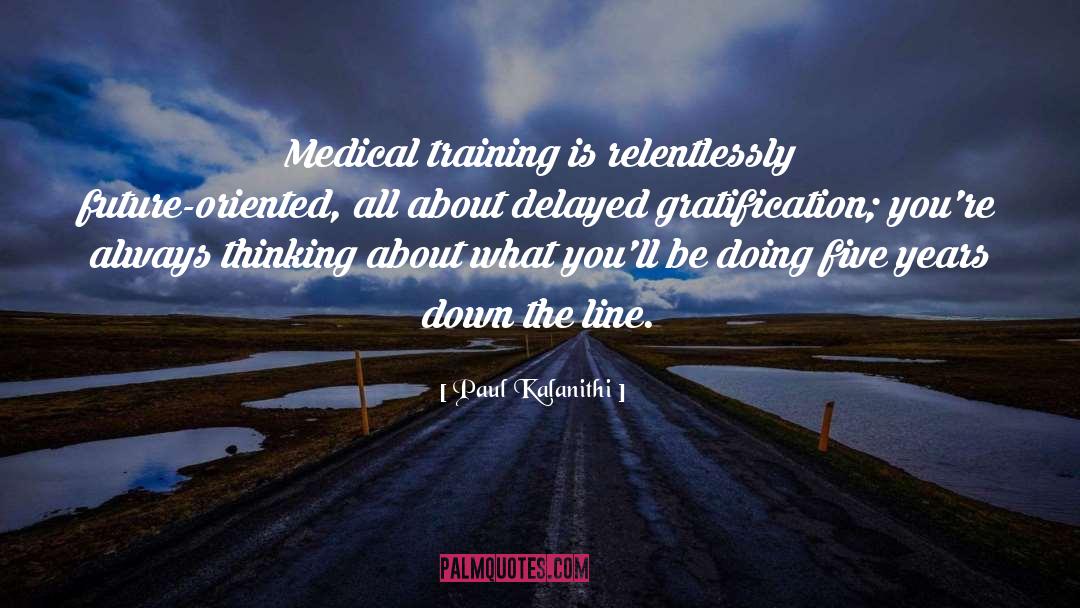
The decision to operate at all involves an appraisal of one's own abilities, as well as a deep sense of who the patient is and what she holds dear.
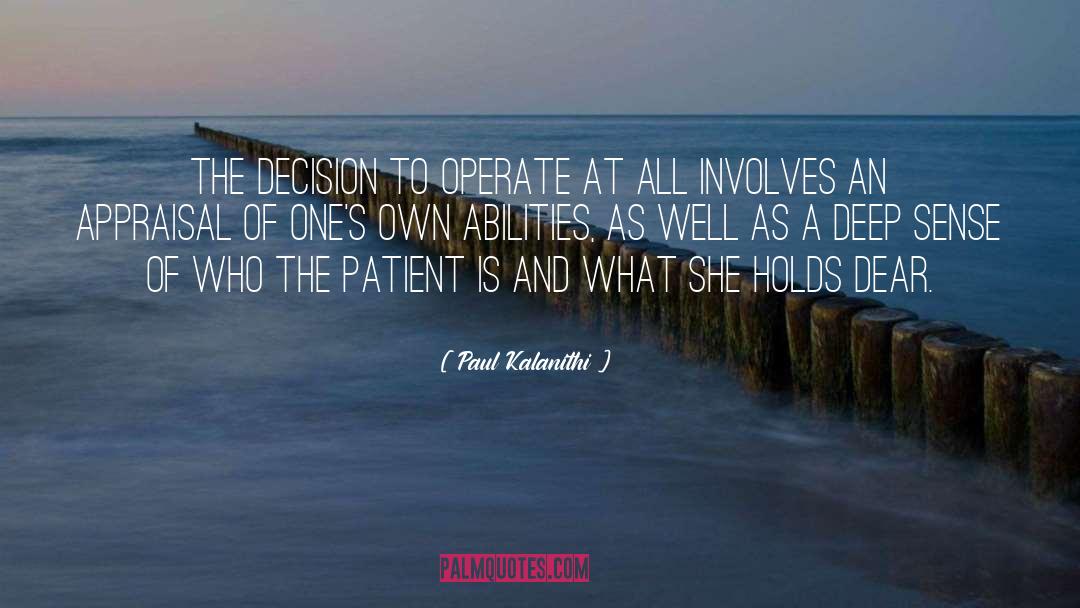
Years ago, it had occurred to me that Darwin and Nietzsche agreed on one thing: the defining characteristic of the organism is striving. Describing
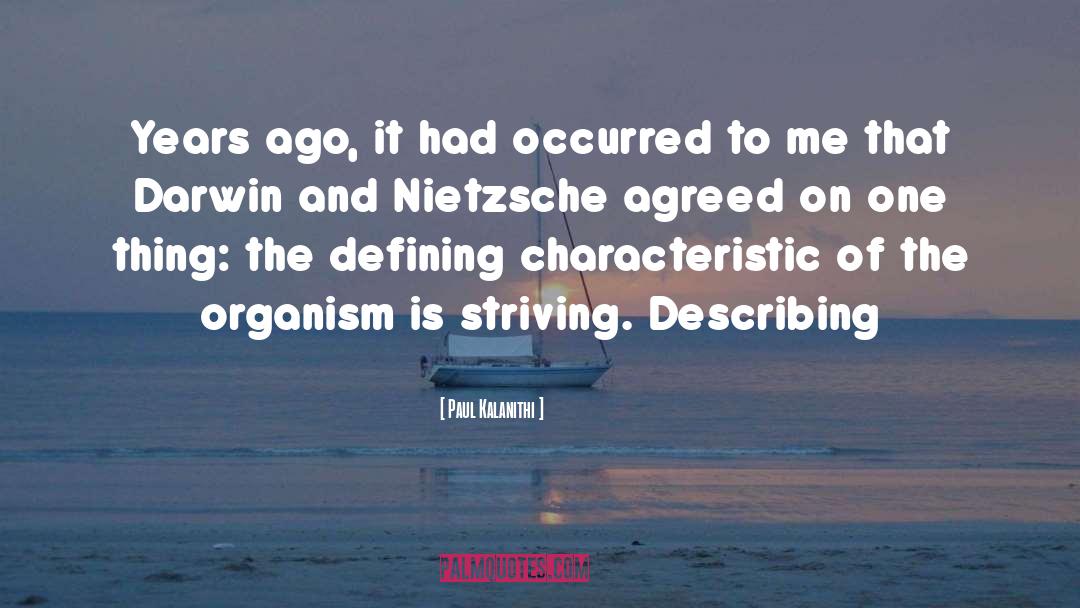
Neurosurgery requires a commitment to one's own excellence and a commitment to another's identity. The
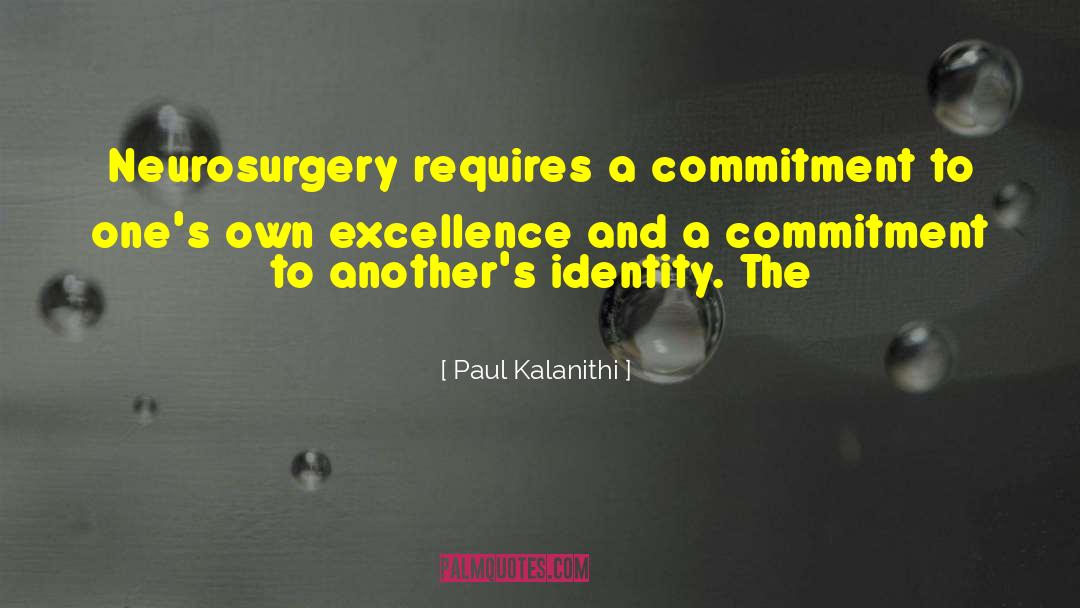
At home in bed a few weeks before he died, I asked him, "Can you breathe okay with my head on your chest like this?" His answer was "It's the only way I know how to breathe.
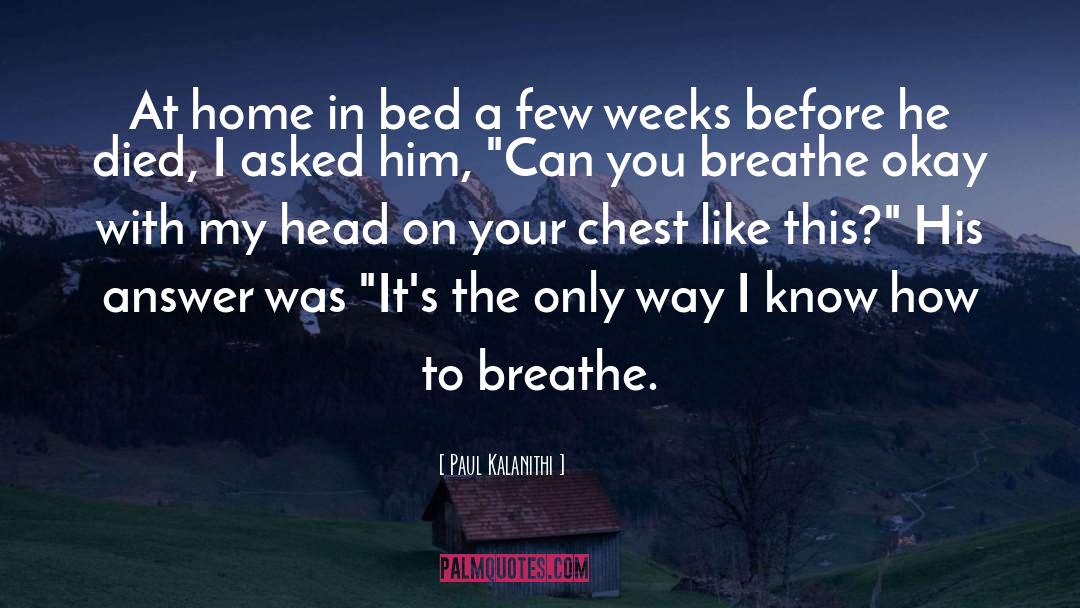
My state of knowledge was the same, but my ability to make lunch plans had been shot to hell. The way forward would seem obvious, if only I knew how many months or years I had left. Tell me three months, I'd spend time with family. Tell me one year, I'd write a book. Give me ten years, I'd get back to treating diseases. The truth that you live one day at a time didn't help: What was I supposed to do with that day? At
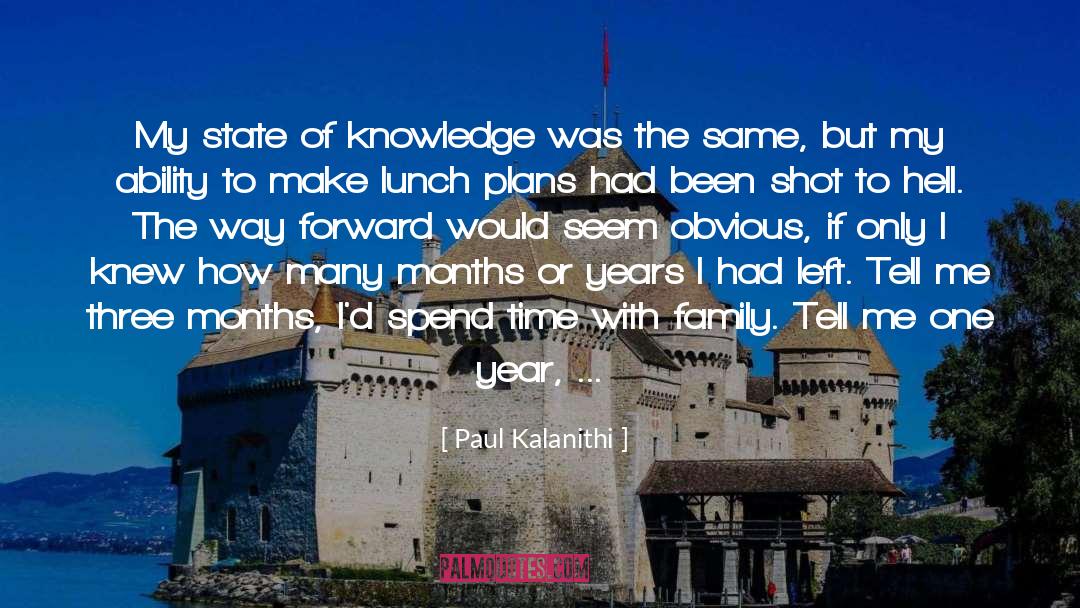
Do you think my life has meaning? Did I make the right choices?

How little do doctors understand the hells through which we put patients.
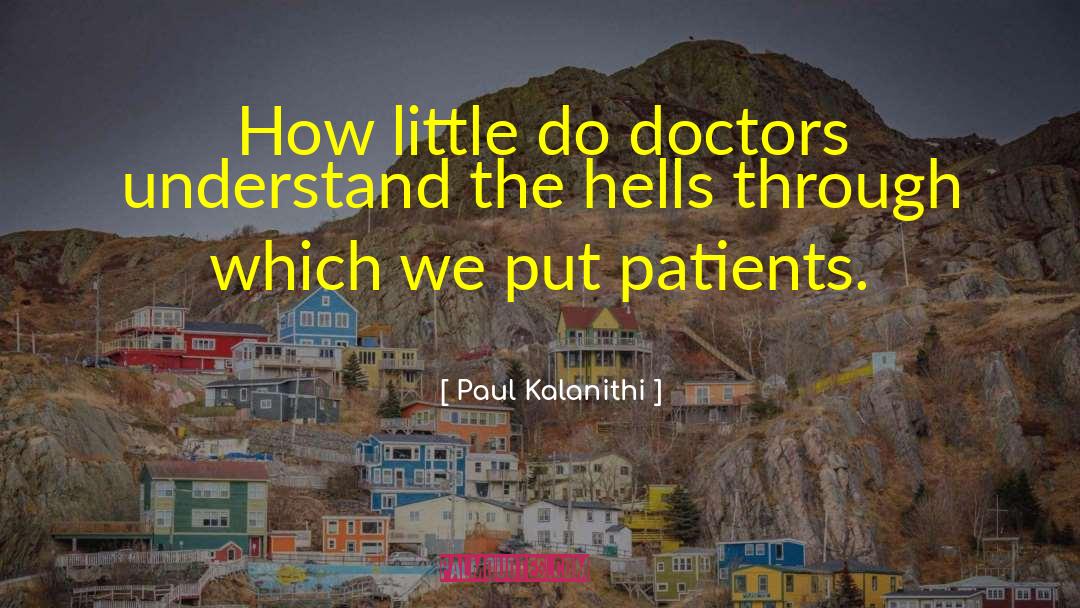
Few books I had read so directly and wholly addressed that fundamental fact of existence: all organisms, whether goldfish or grandchild, die.
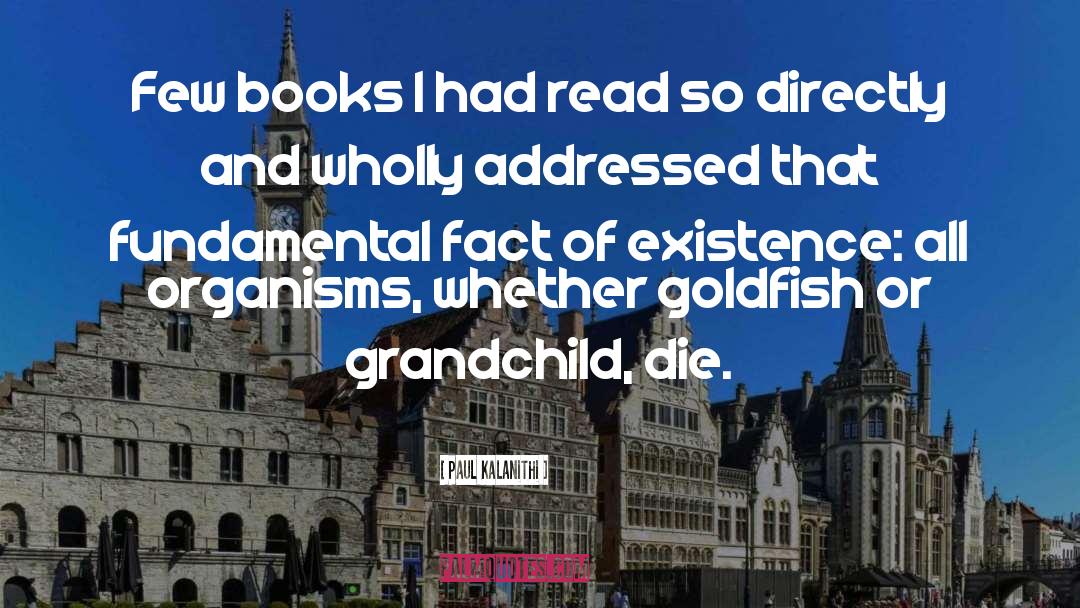
Diseases are molecules misbehaving; the basic requirement of life is metabolism, and death its cessation.
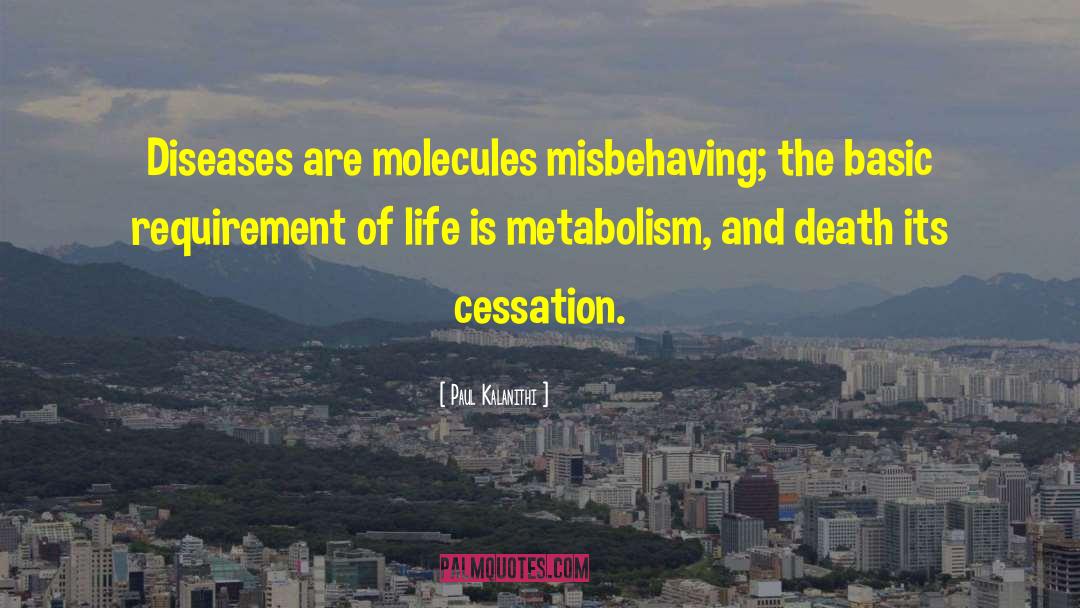
That message is simple: When you come to one of the many moments in life when you must give an account of yourself, provide a ledger of what you have been, and done, and meant to the world, do not, I pray, discount that you filled a dying man's days with a sated joy, a joy unknown to me in all my prior years, a joy that does not hunger for more and more, but rests, satisfied. In this time, right now, that is an enormous thing.
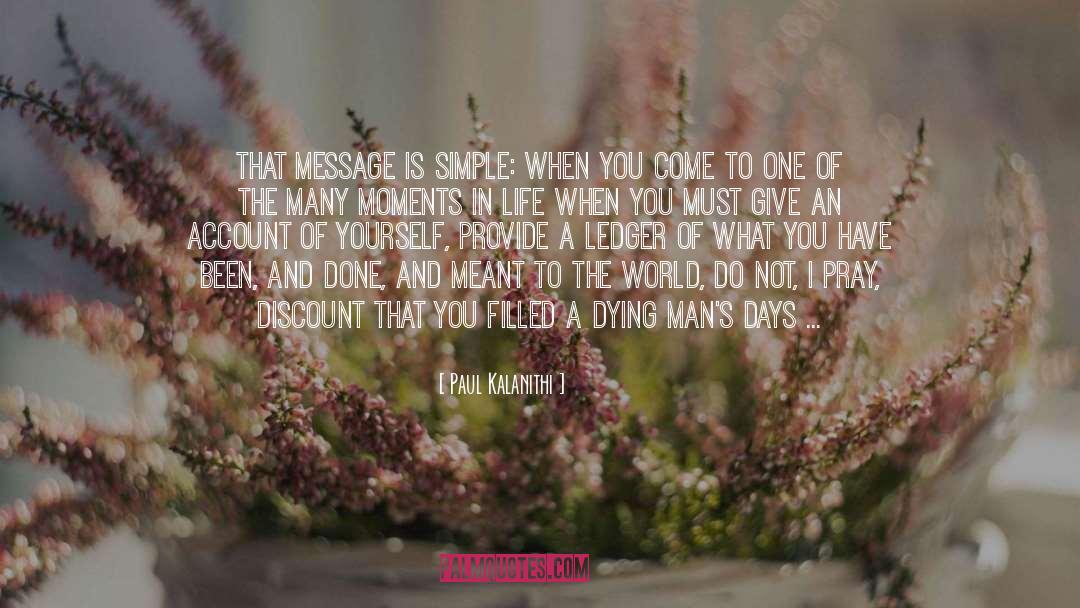
Paul faced each stage of his illness with grace - not with bravado or a misguided faith that he would "overcome" or "beat" cancer but with an authenticity that allowed him to grieve the loss of the future he had planned and forge a new one.
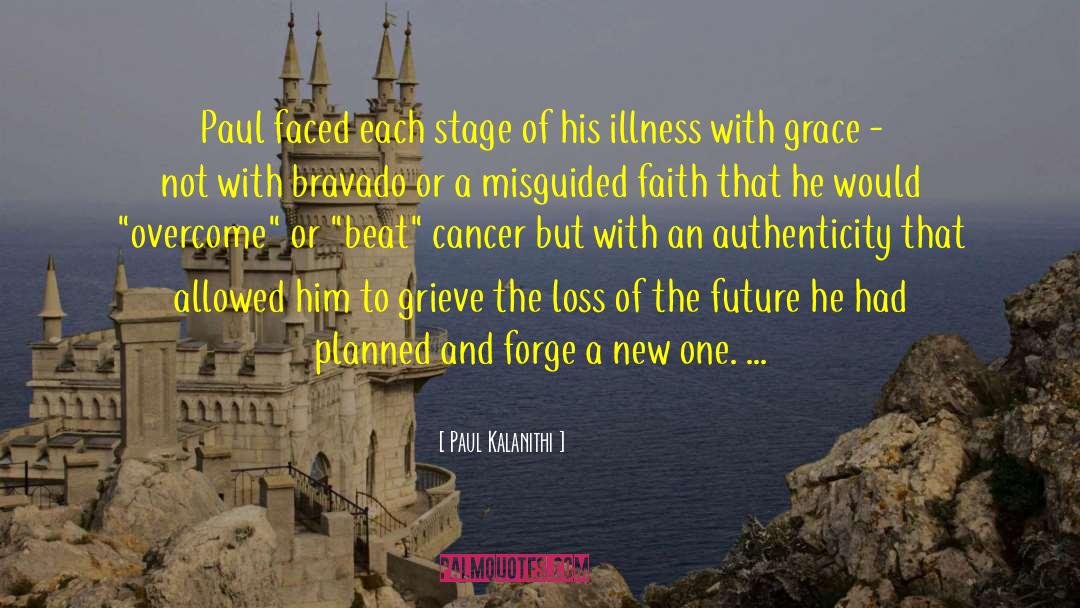
Frail but never weak.
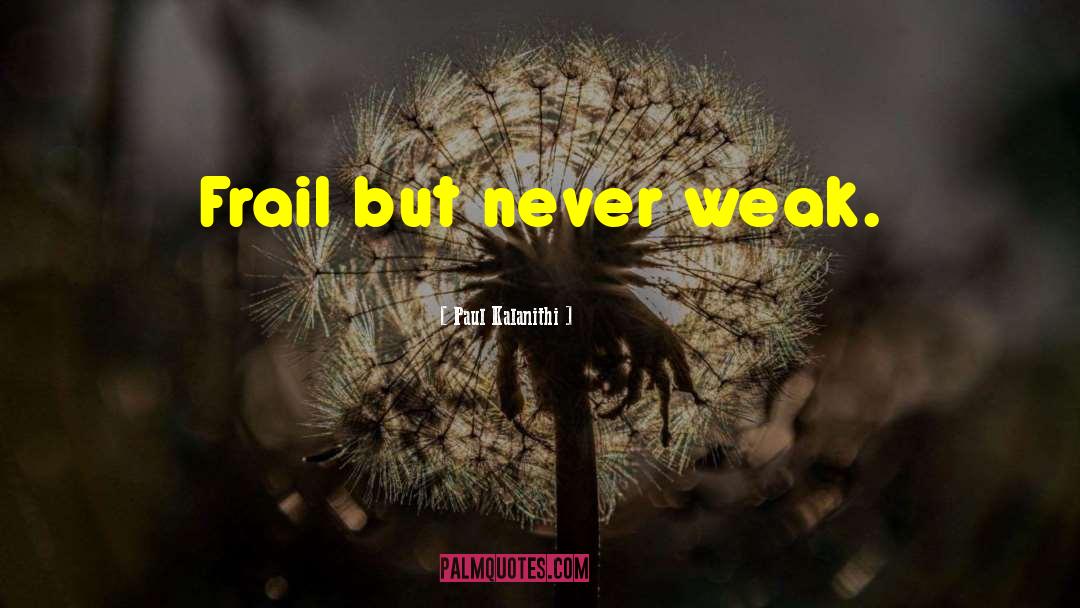
This book carries the urgency of racing against time, of having important things to say. Paul confronted death - examined it, wrestled with it, accepted it - as a physician and a patient. He wanted to help people understand death and face their mortality.
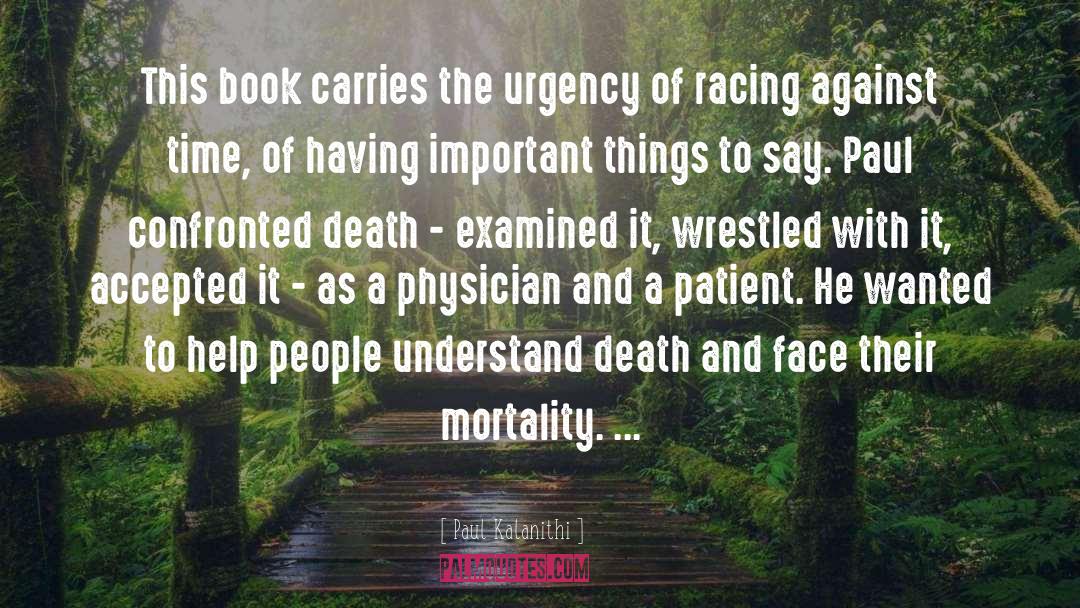
After I was caught returning at dawn from one such late-night escapade, my worried mother thoroughly interrogated me regarding every drug teenagers take, never suspecting that the most intoxicating thing I'd experienced, by far, was the volume of romantic poetry she'd handed me the previous week. Books became my closest confidants, finely ground lenses providing new views of the world.
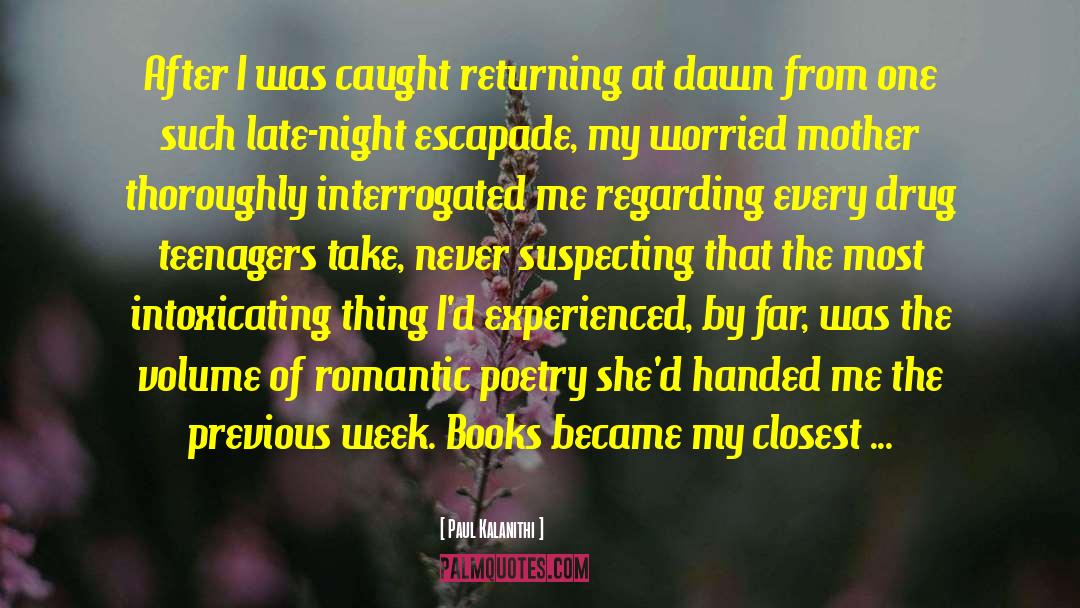
Before operating on a patient's brain, I realized, I must first understand his mind: his identity, his values, what makes his life worth living, and what devastation makes it reasonable to let that life end.
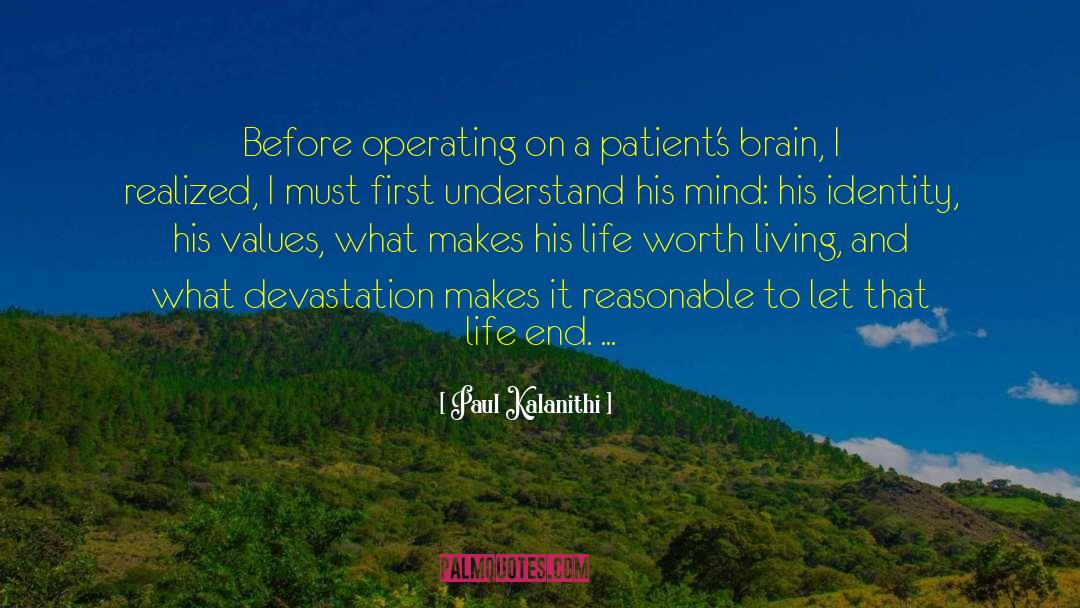
Nobody has it coming.
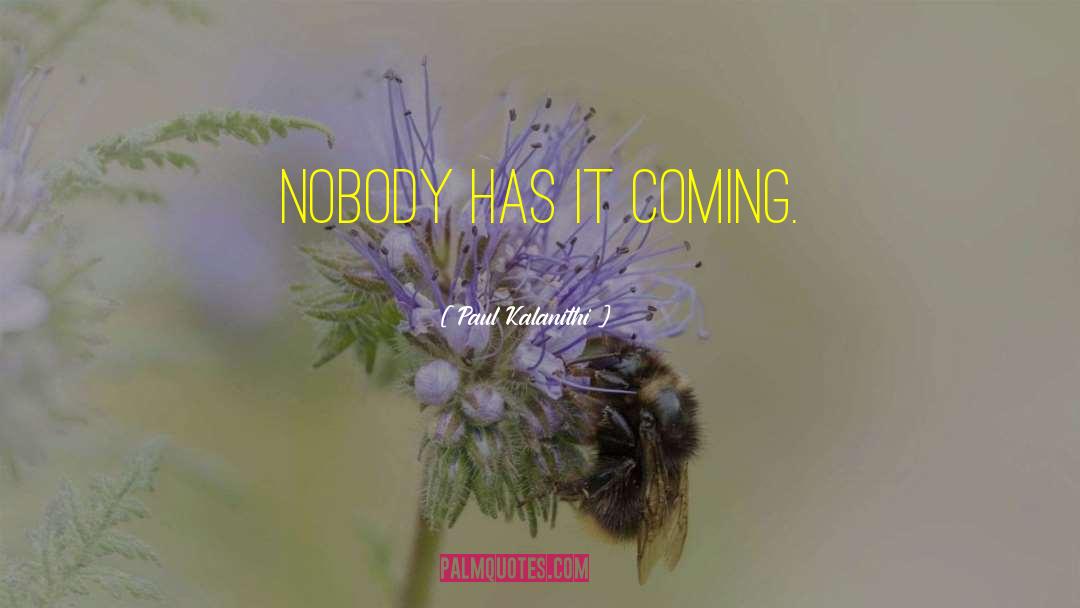
A tureen of tragedy was best allotted by the spoonful. Only a few patients demanded the whole at once; most needed time to digest.
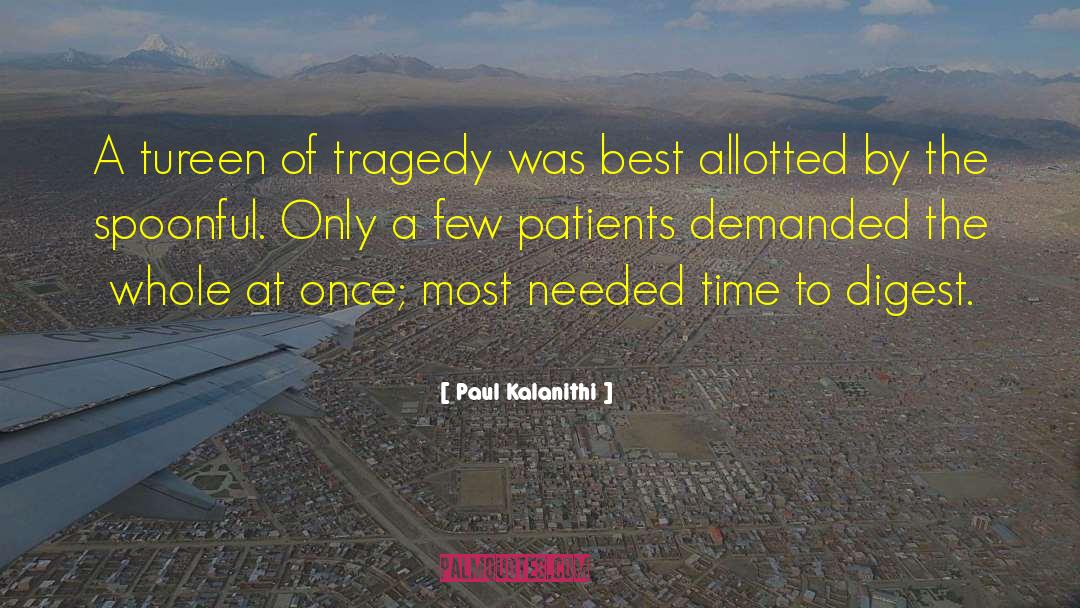
Putting lifestyle first is how you find a job --- not a calling.
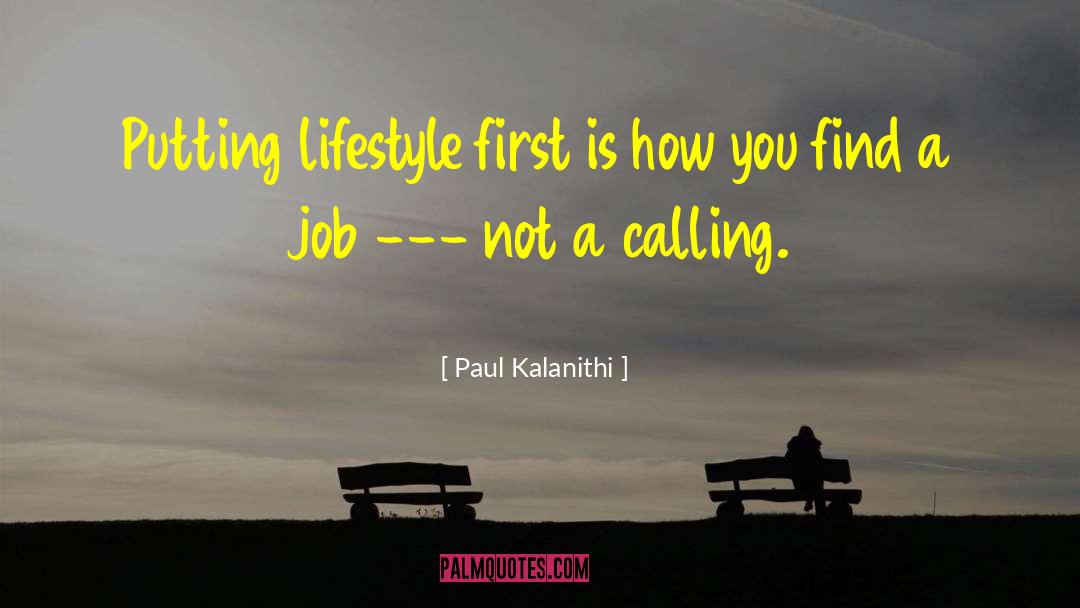
Death comes for all of us. For us, for our patients: it is our fate as living, breathing, metabolizing organisms. Most lives are lived with passivity toward death - it's something that happens to you and those around you.
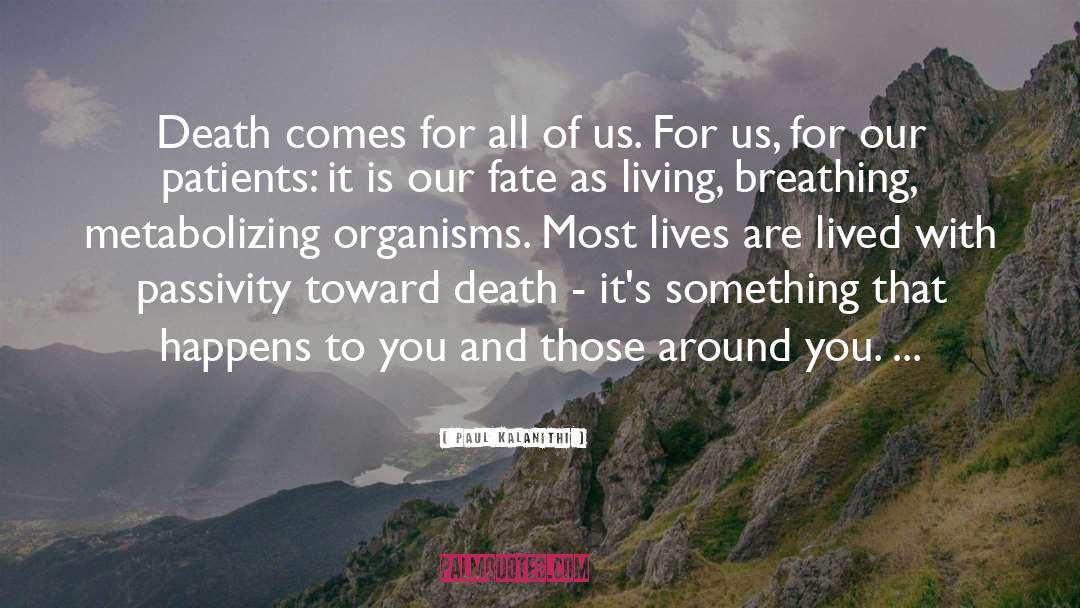
If you believe that science provides not basis for God, then you are almost obligated to conclude that science provides no basis for meaning and, there for, life itself doesn't have any. In other words, existential claims have no weight; all knowledge is scientific knowledge. Yet the paradox is that scientific methodology is the product of human hands and thus cannot reach some permanent truth. We build scientific theories to organize and manipulate the world, to reduce phenomena into manageable units. Science is based on reproducibility and manufactured objectivity. As strong as that makes its ability to generate claims about matter and energy, it also makes scientific knowledge inapplicable to the existential, visceral nature or human life, which is unique and subjective and unpredictable. Science may provide the most useful may to organize empirical, reproducible data, but its power to do so is predicated on its inability to grasp the most central aspects of human life: hope, fear, love, hate, beauty, envy, honor, weakness, striving, suffering, virtue.
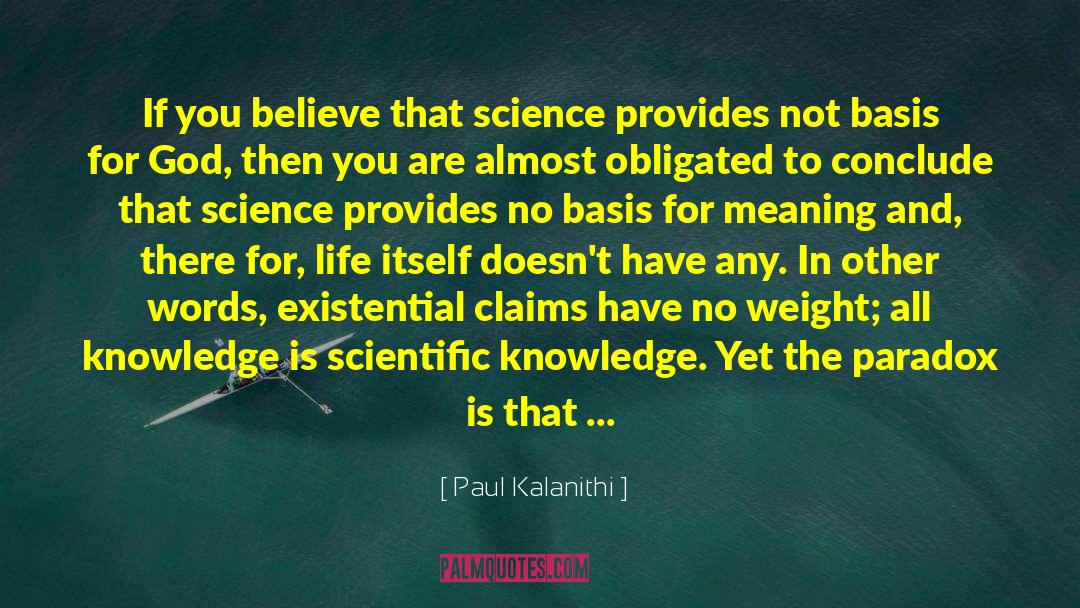
there's that study that says doctors do a worse job prognosticating for patients they're personally invested in.
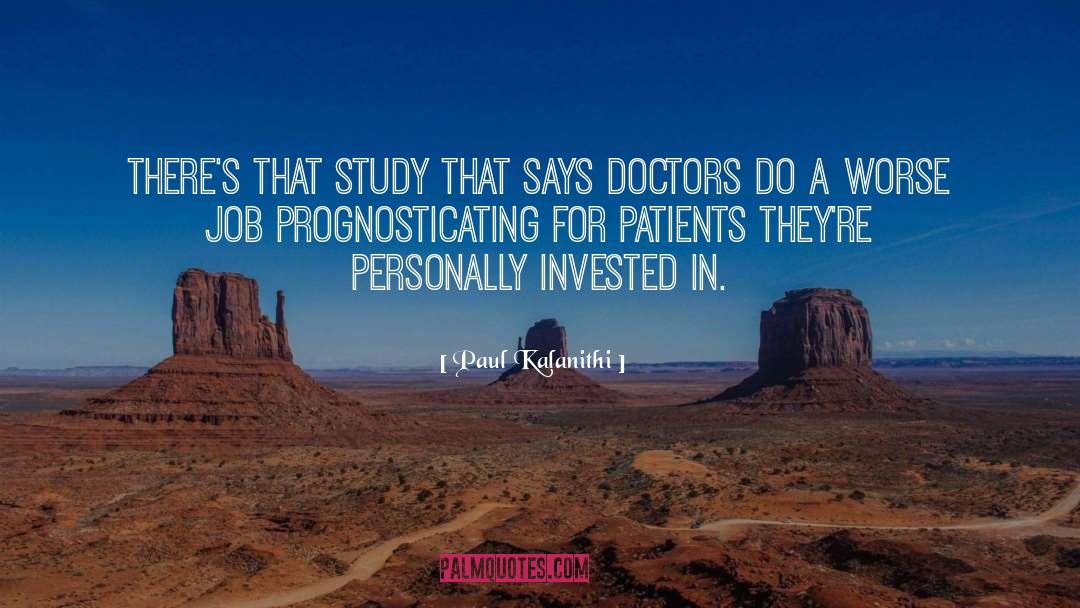
And as I sat there, I realized that the questions intersecting life, death, and meaning, questions that all people face at some point, usually arise in a medical context.
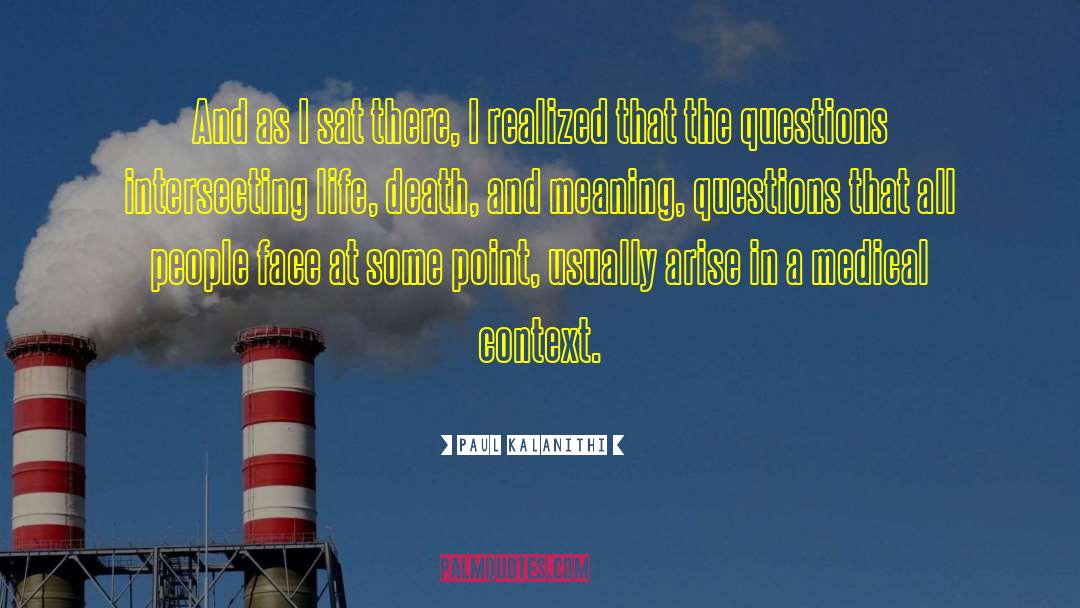
We each joked to close friends that the secret to saving a relationship is for one person to become terminally ill. Conversely, we knew that one trick to managing a terminal illness is to be deeply in love - to be vulnerable, kind, generous, grateful.
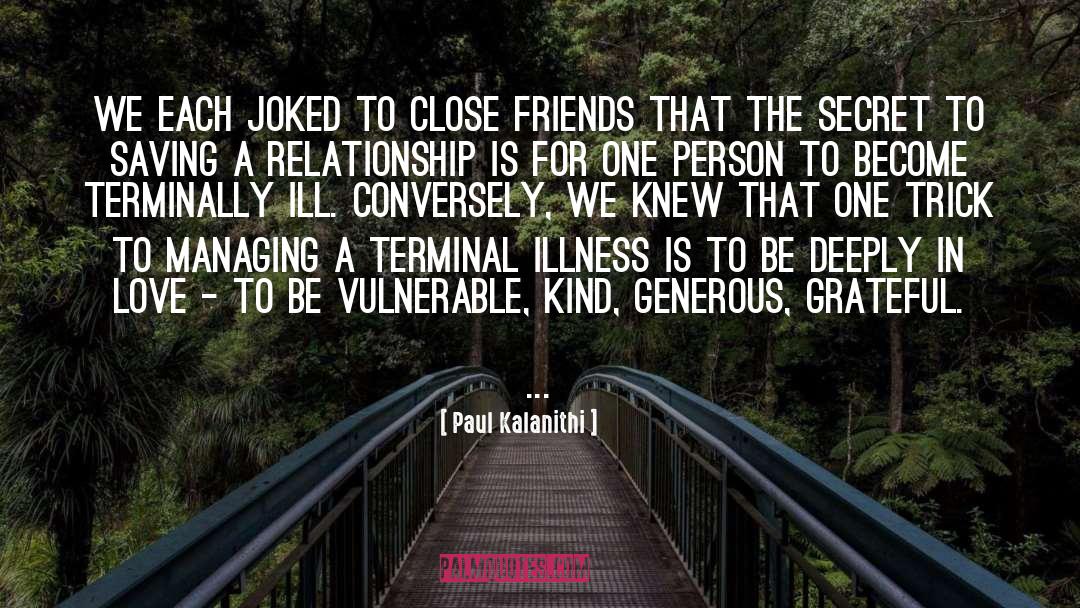
What happened to Paul was tragic, but he was not a tragedy.
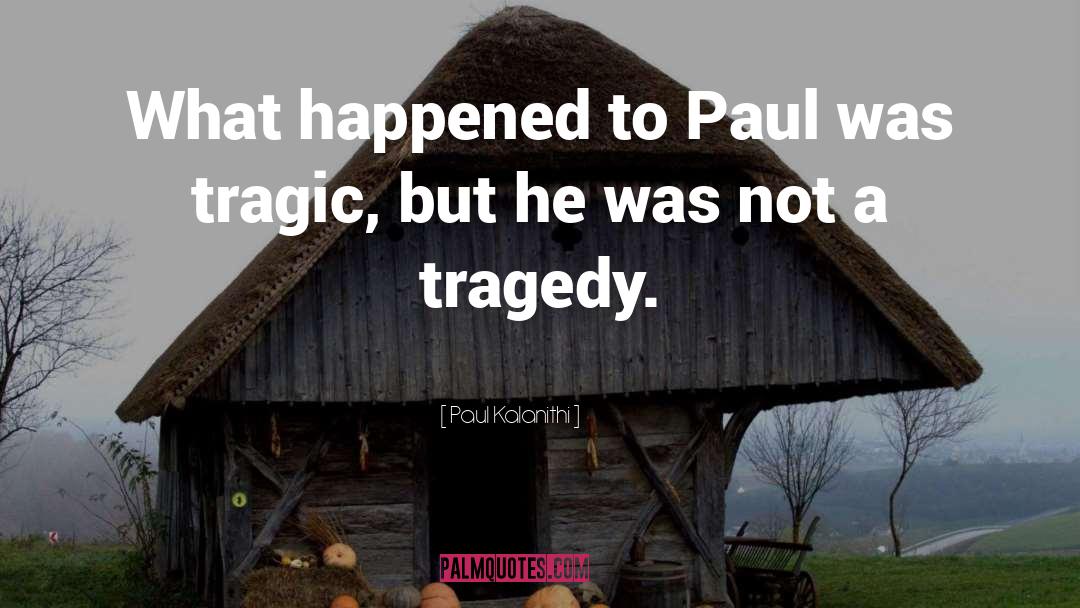
The mind was simply the operation of the brain.
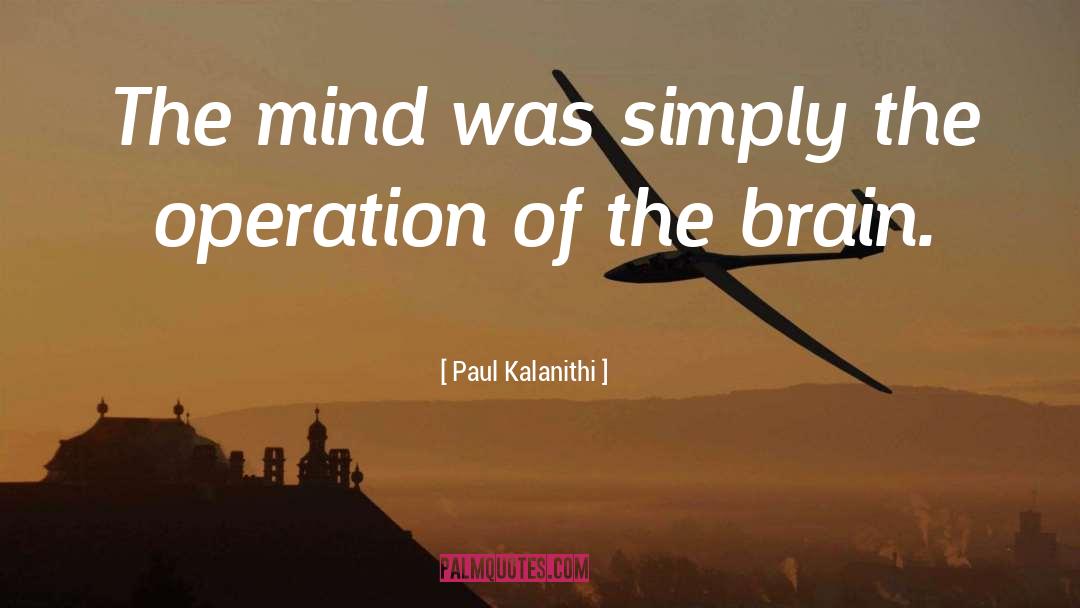
At moments, the weight of it all became palpable. It was in the air, the stress and misery. Normally, you breathed it in, without noticing it. But some days, like a humid muggy day, it had a suffocating weight of its own. Some days, this is how it felt when I was in the hospital: trapped in an endless jungle summer, wet with sweat, the rain of tears of the families of the dying pouring down.
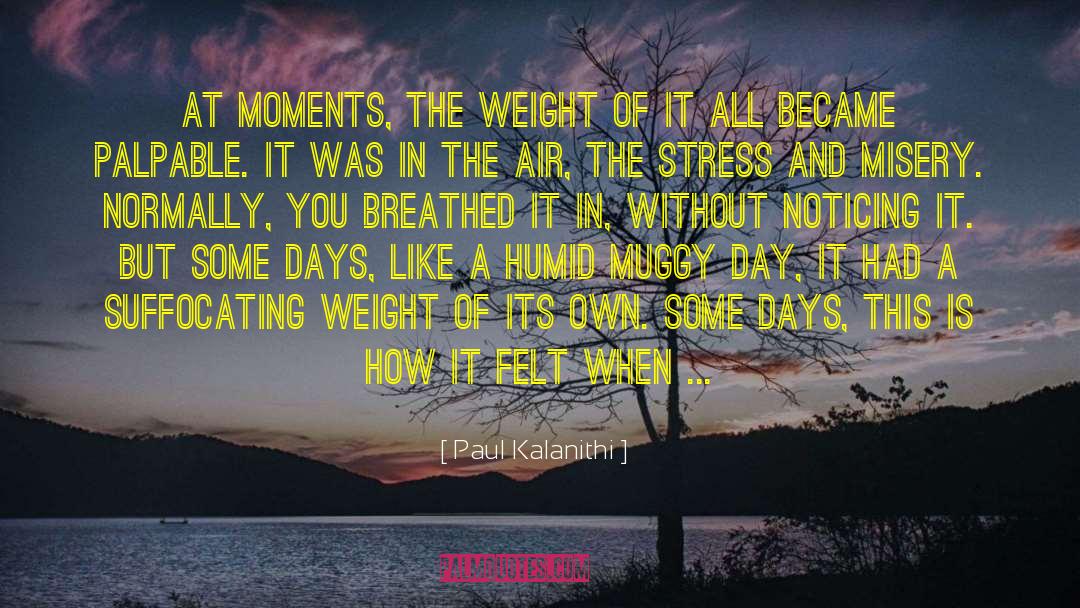
Surely intelligence wasn't enough; moral clarity was needed as well.
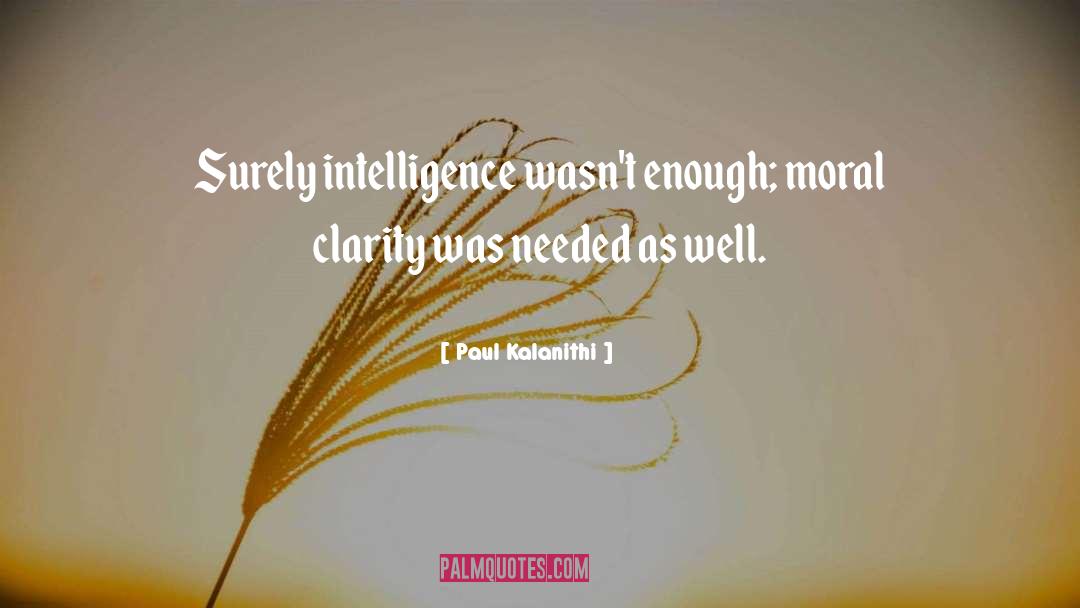
Standing at the crossroads where I should have been able to see and follow the footprints of the countless patients I had treated over the years, I saw instead only a blank, a harsh, vacant, gleaming white desert, as if a sandstorm had erased all trace of familiarity.
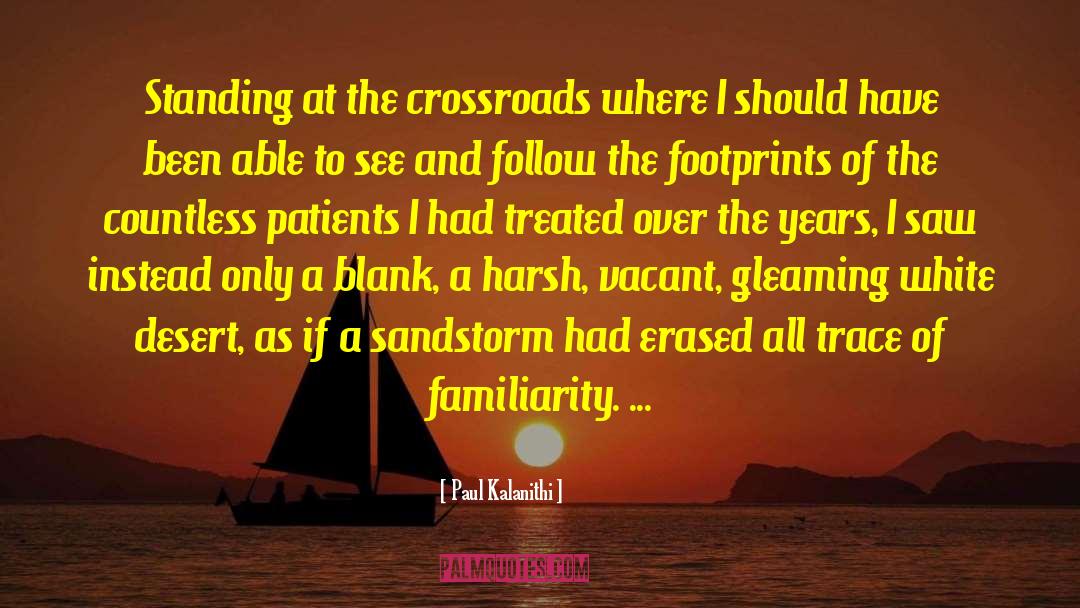
If boredom is, as Heidegger argued, the awareness of time passing, then surgery felt like the opposite: the intense focus made the arms of the clock seem arbitrarily placed. Two hours could feel like a minute.
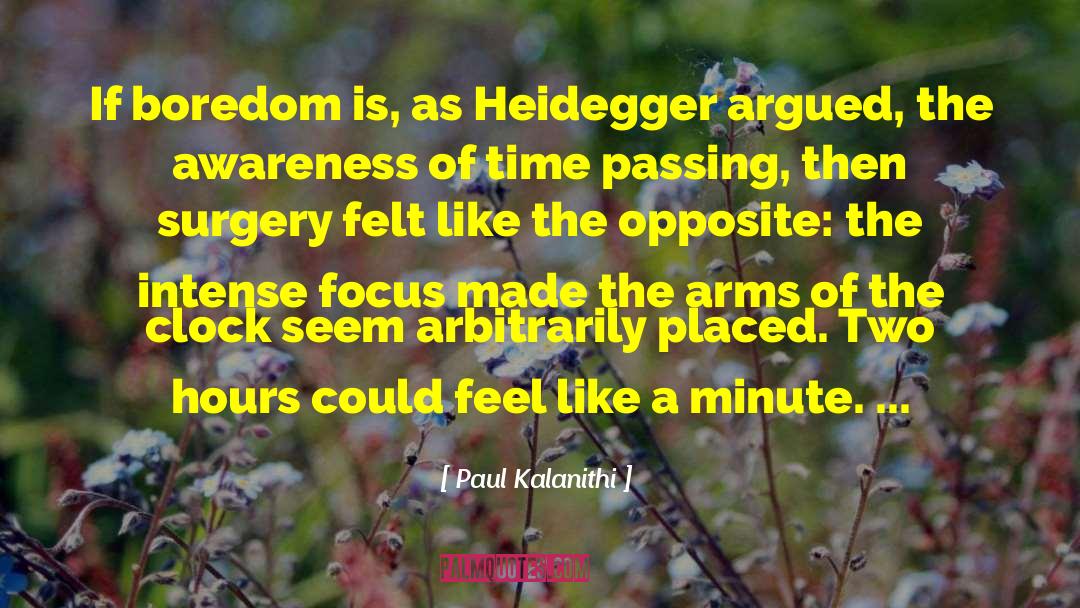
I was searching for a vocabulary with which to make sense of death, to find a way to begin defining myself and inching forward again. The privilege of direct experience had led me away from literary and academic work, yet now I felt that to understand my own experiences, I would have to translate them back into language. Hemingway described his process in similar terms: acquiring rich experiences, then retreating to cogitate and write about them. I needed words to go forward.
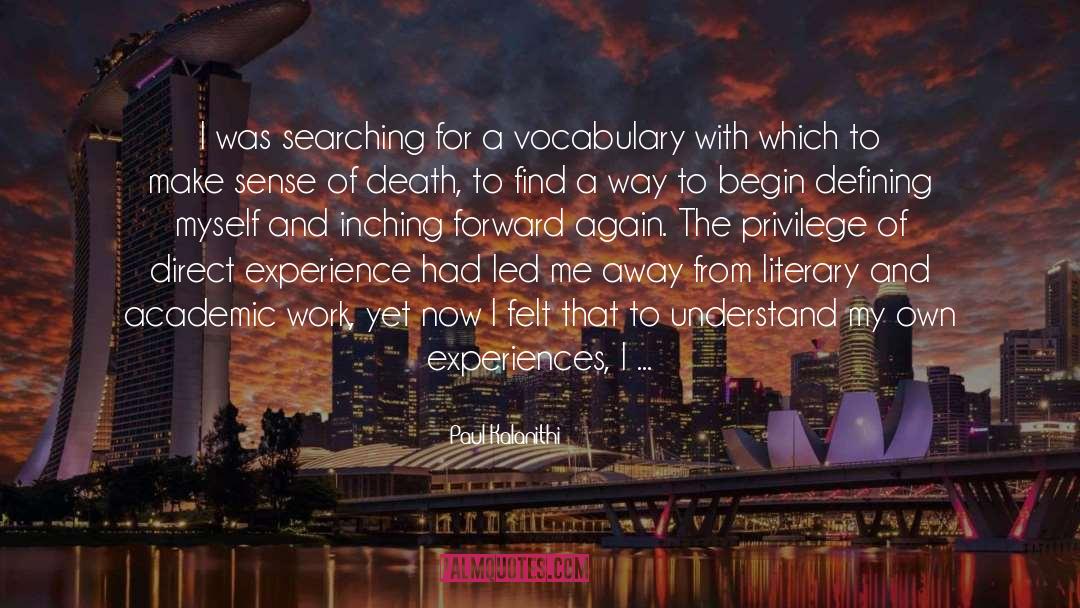
When there is no place for the scalpel, words are the surgeon's only tool.
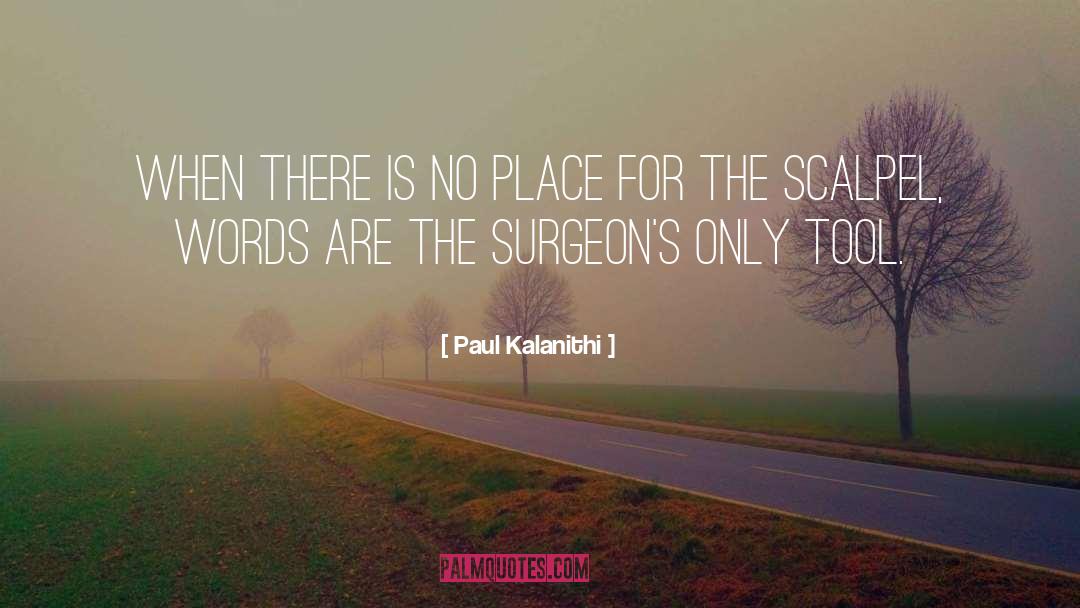
I was startled to realize that in spite of everything, the last few months had had one area of lightness: not having to bear the tremendous weight of the responsibility neurosurgery demanded - and part of me wanted to be excused from picking up the yoke again. Neurosurgery is really hard work, and no one would have faulted me for not going back. (People often ask if it is a calling, and my answer is always yes. You can't see it as a job, because if it's a job, it's one of the worst jobs there is.) A couple of my professors actively discouraged the idea: "Shouldn't you be spending time with your family?" ("Shouldn't you?" I wondered. I was making the decision to do this work because this work, to me, was a sacred thing.)
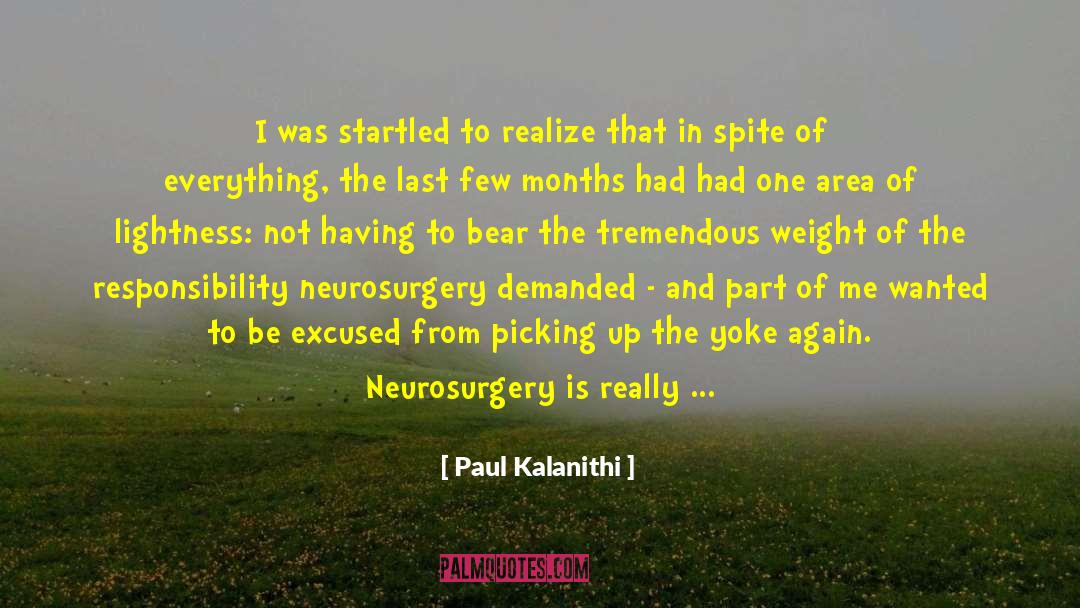
If the hare makes too many missteps and has to keep adjusting, the tortoise wins. If the tortoise spends too much time planning each step, the hare wins.
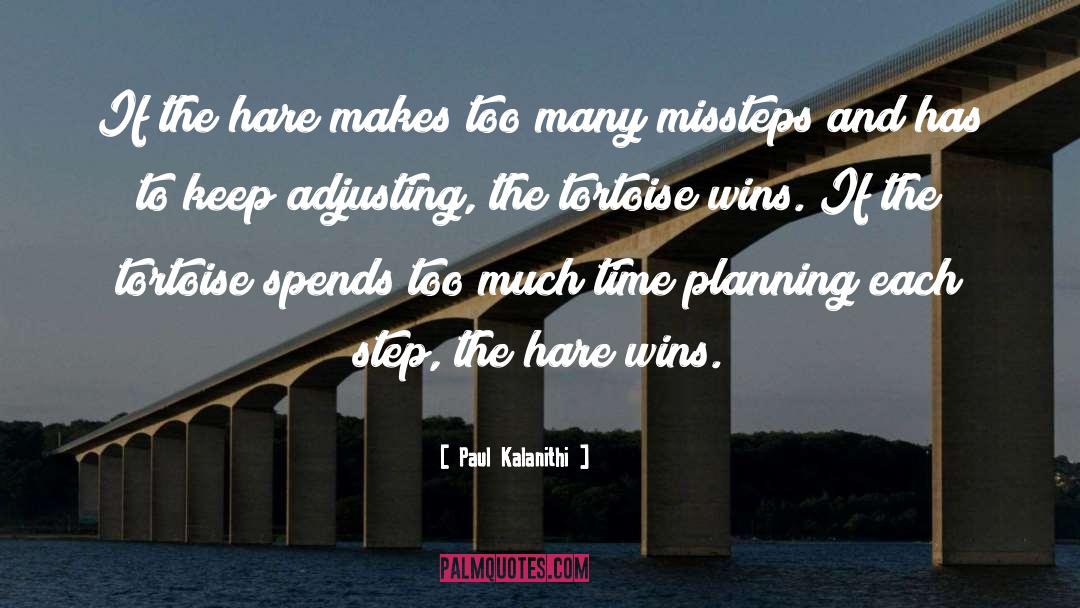
If the unexamined life was not worth living, was the unlived life worth examining?
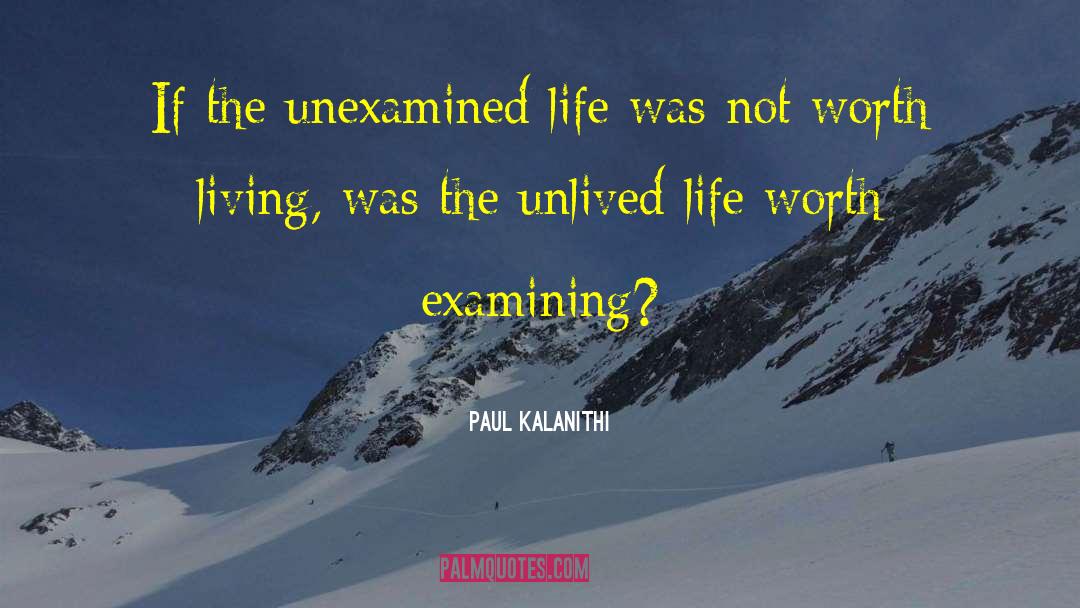
I would have to learn to live in a different way, seeing death as an imposing itinerant visitor but knowing that even if I'm dying, until I actually die, I am still living.
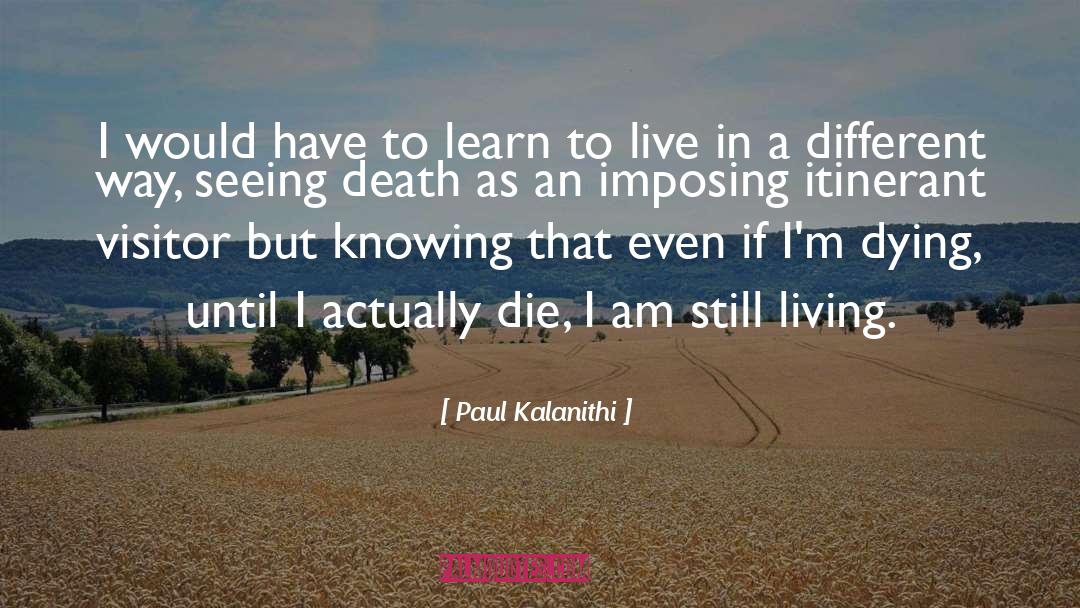
I was pursuing medicine to bear witness to the twinned mysteries of death, its experiential and biological manifestations: at once deeply personal and utterly impersonal.
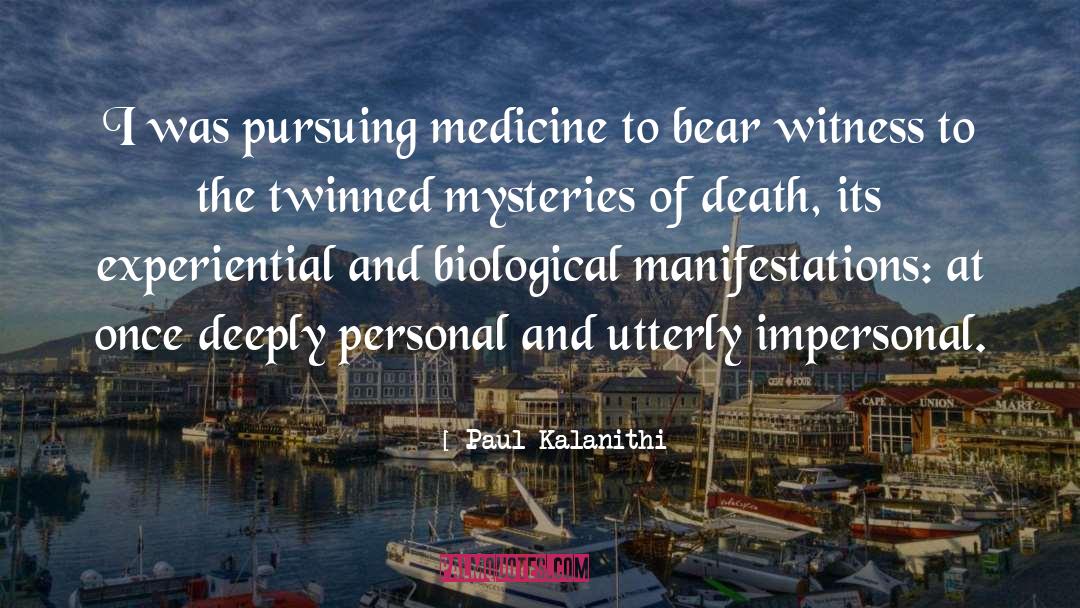
Yet the paradox is that scientific methodology is the product of human hands and thus cannot reach some permanent truth. We build scientific theories to organize and manipulate the world, to reduce phenomena into manageable units. Science is based on reproducibility and manufactured objectivity. As strong as that makes its ability to generate claims about matter and energy, it also makes scientific knowledge inapplicable to the existential, visceral nature of human life, which is unique and subjective and unpredictable. Science may provide the most useful way to organize empirical, reproducible data, but its power to do so is predicated on its inability to grasp the most central aspects of human life: hope, fear, love, hate, beauty, envy, honor, weakness, striving, suffering, virtue. Between
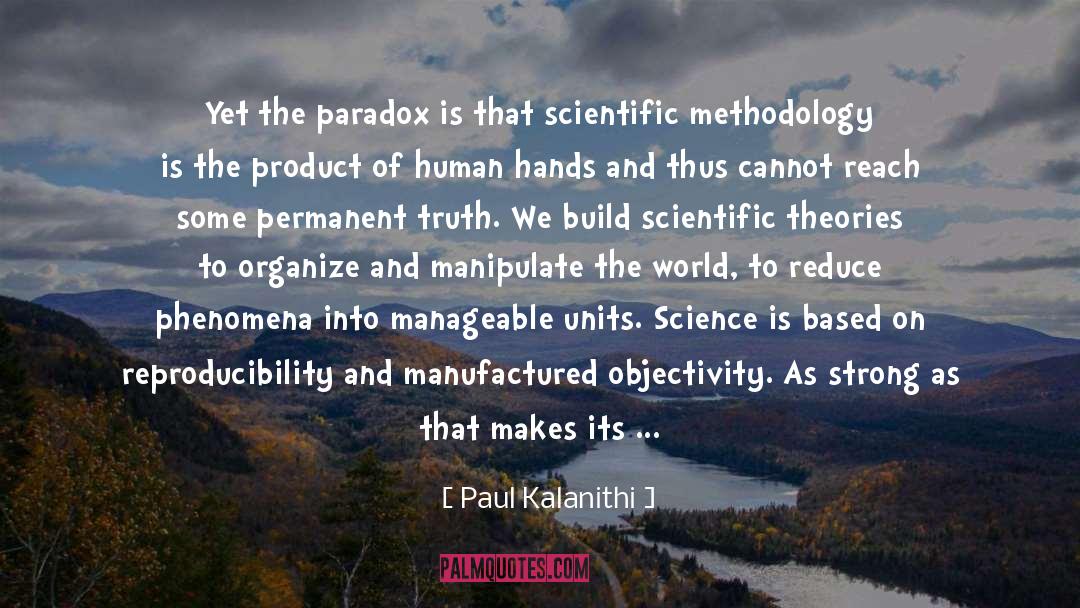
My brain was fine, but I did not feel like myself. My body was frail and weak - the person who could run half marathons was a distant memory - and that, too, shapes your identity. Racking back pain can mold an identity; fatigue and nausea can, as well.
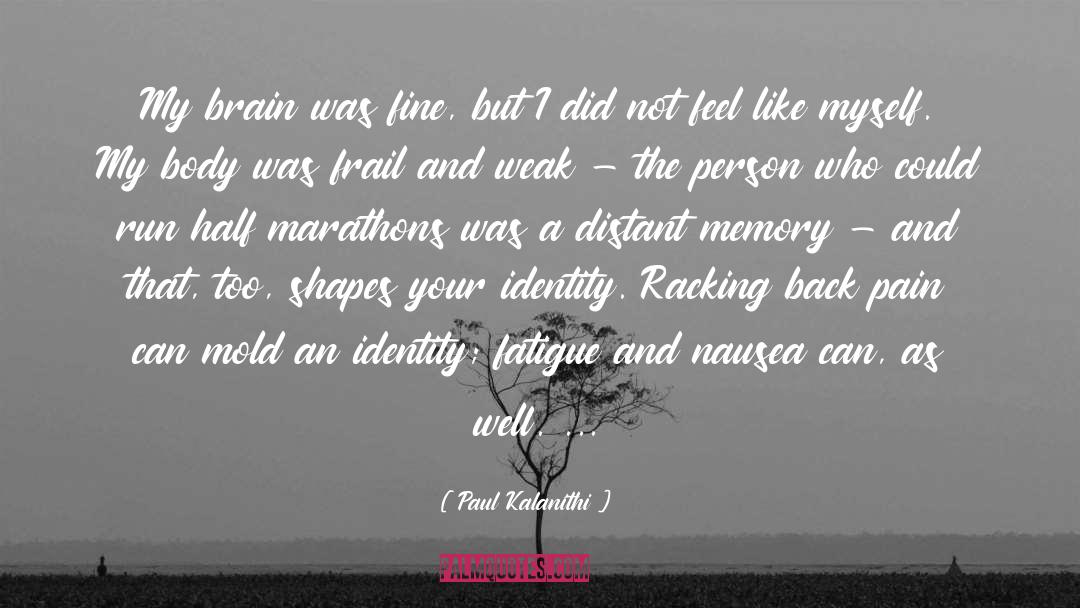
Most ambitions are either achieved or abandoned; either way, they belong to the past. The future, instead of the ladder toward the goals of life, flattens out into a perpetual present.
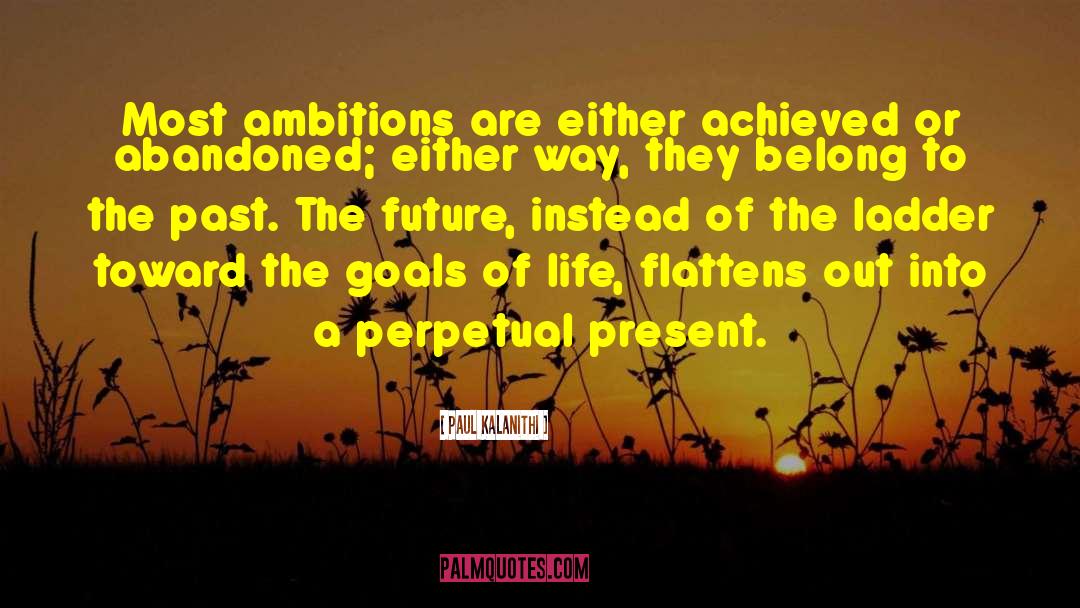
While all doctors treat diseases, neurosurgeons work in the crucible of identity: every operation on the brain is, by necessity, a manipulation of the substance of our selves, and every conversation with a patient undergoing brain surgery cannot help but confront this fact. In addition, to the patient and family, the brain surgery is usually the most dramatic event they have ever faced and, as such, has the impact of any major life event. At those critical junctures, the question is not simply whether to live or die but what kind of life is worth living. Would you trade your ability - or your mother's - to talk for a few extra months of mute life? The expansion of your visual blind spot in exchange for eliminating the small possibility of a fatal brain hemorrhage? Your right hand's function to stop seizures? How much neurologic suffering would you let your child endure before saying that death is preferable? Because the brain mediates our experience of the world, any neurosurgical problem forces a patient and family, ideally with a doctor as a guide, to answer this question: What makes life meaningful enough to go on living?
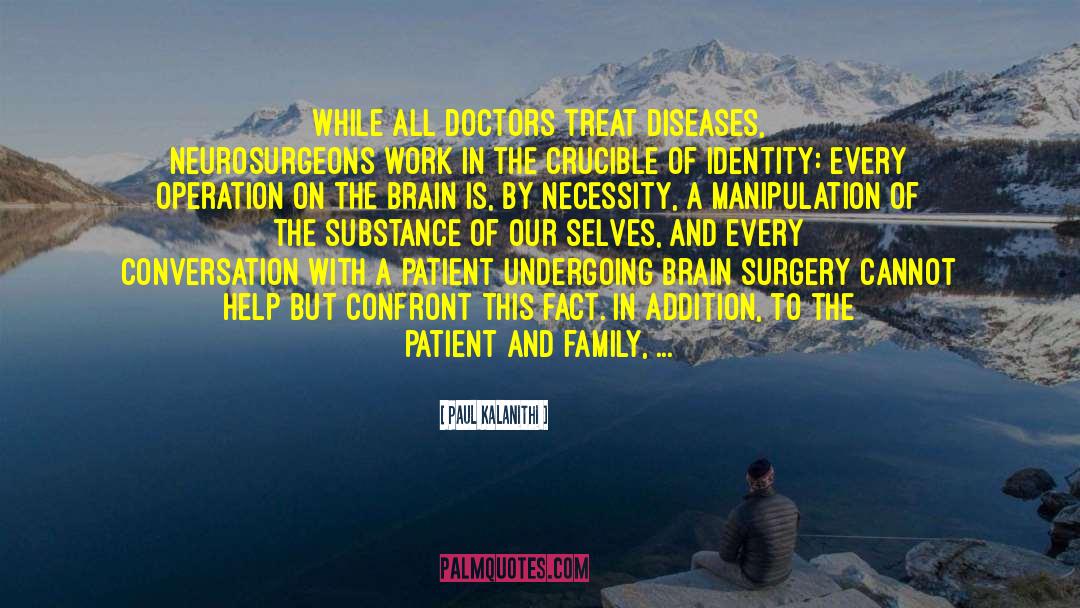
Hemingway described his process in similar terms: acquiring rich experiences, then retreating to cogitate and write about them. I needed words to go forward. And so it was literature that brought.

Science is based on reproducibility and manufactured objectivity. As strong as that makes its ability to generate claims about matter and energy, it also makes scientific knowledge inapplicable to the existential, visceral nature of human life, which is unique and subjective and unpredictable.
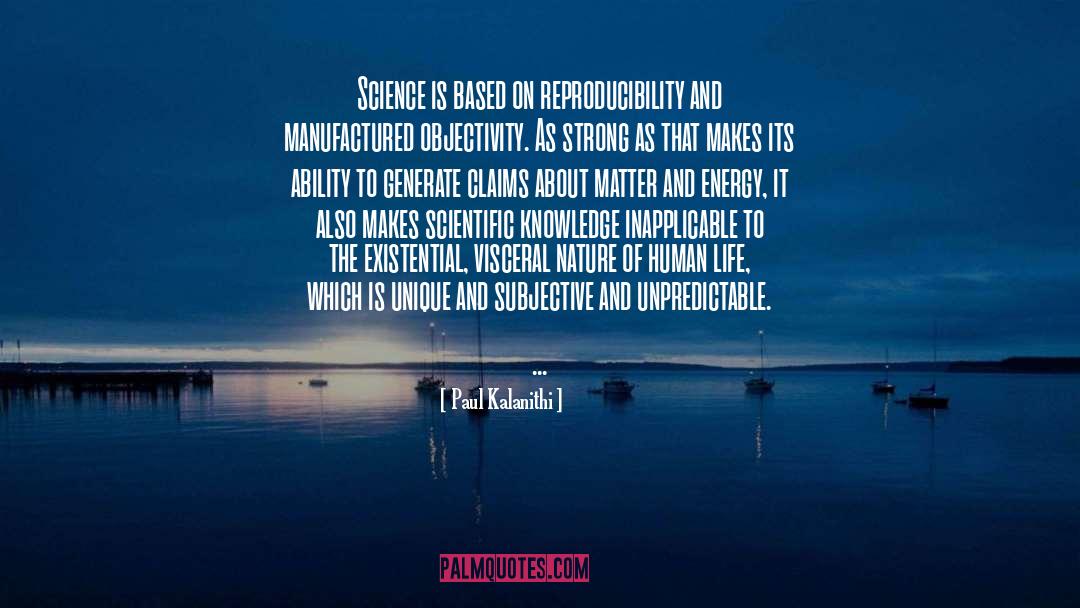
all have a notion of what it means to be good, and we can't live up to it all the time.
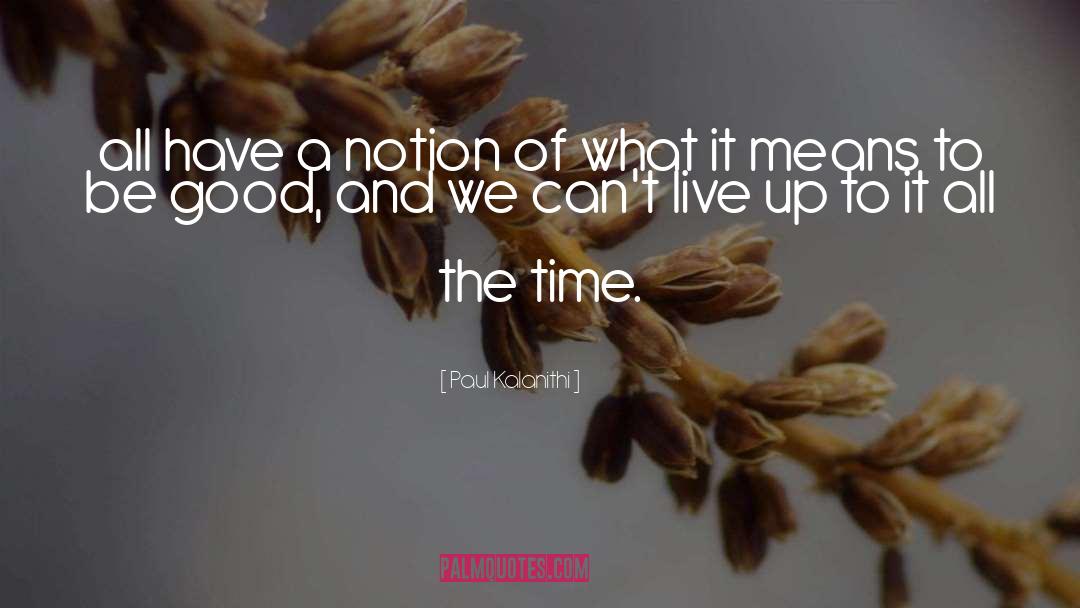
So what tense am I living in now?
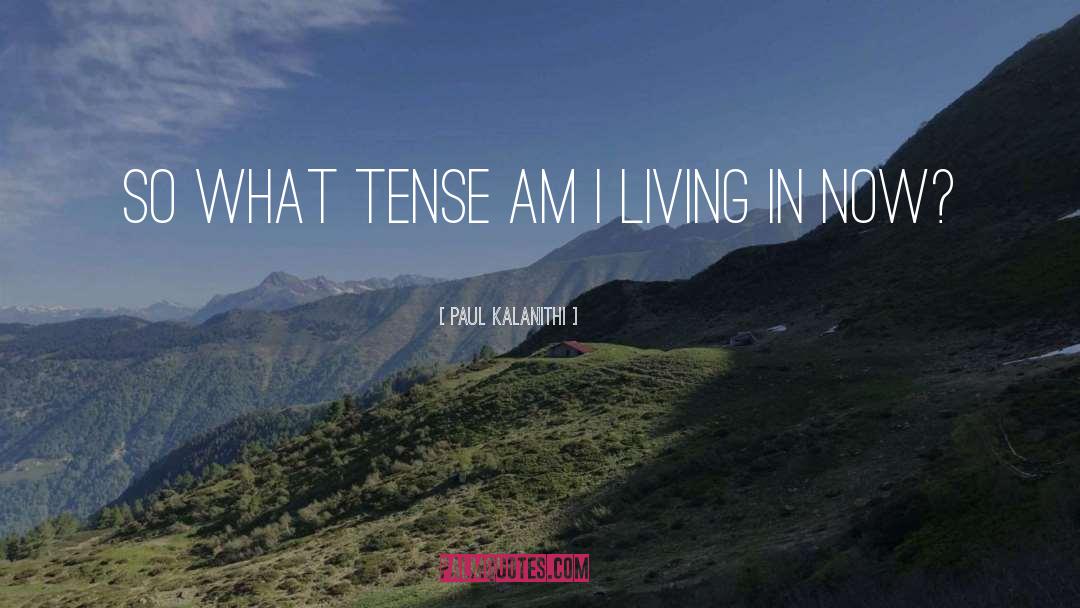
The fact of death is unsettling. Yet there is no other way to live. -
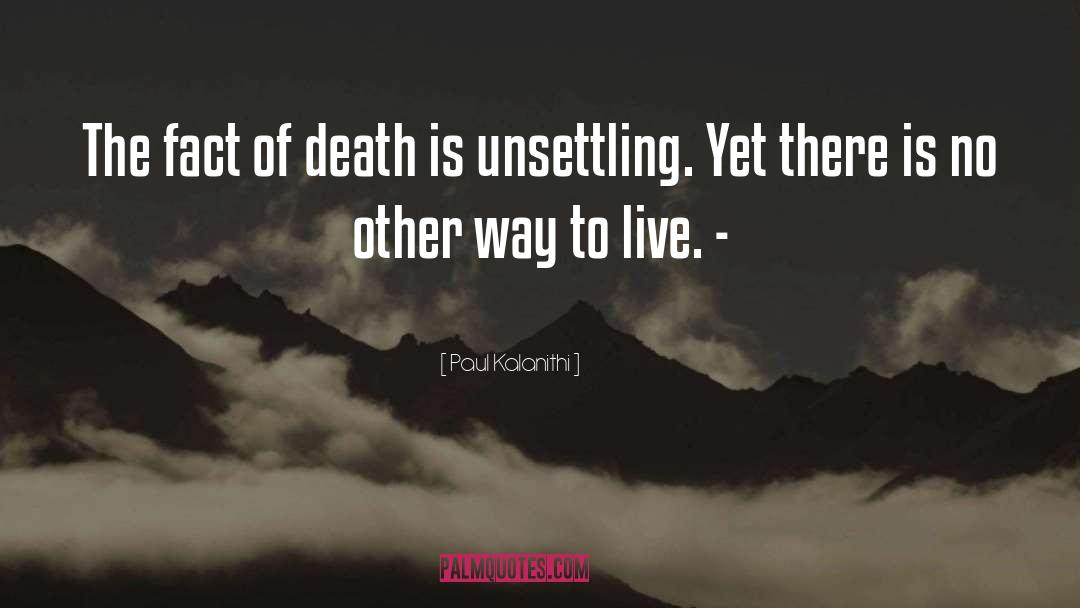
like the ancient Greek concept arete, I thought, virtue required moral, emotional, mental, and physical excellence. Neurosurgery seemed to present the most challenging and
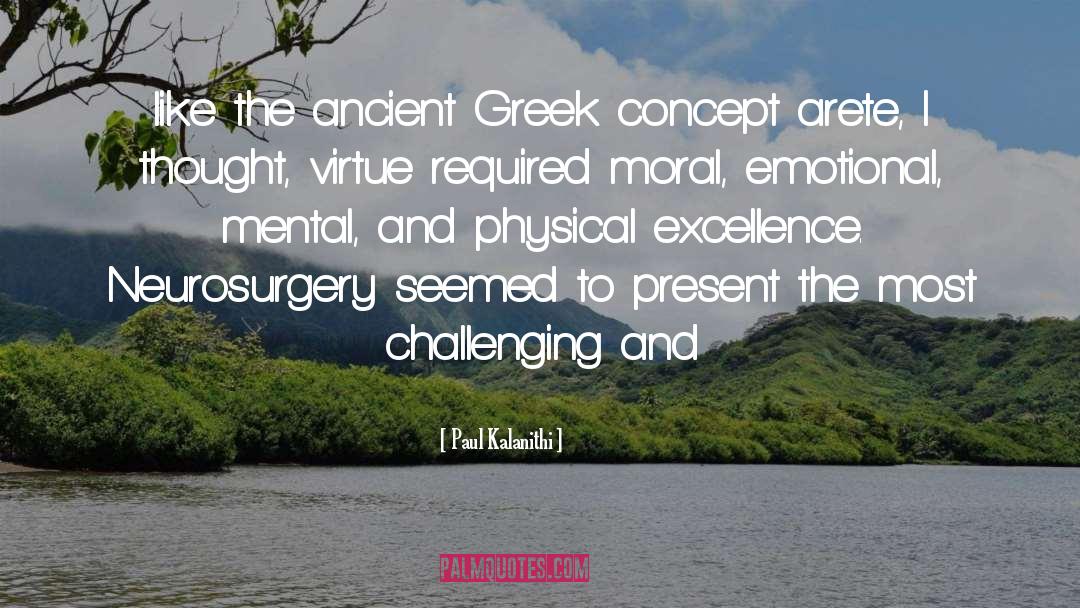
I thought back to med school, when a patient had told me that she always wore her most expensive socks to the doctor's office, so that when she was in a patient's gown and shoeless, the doctor would see the socks and know she was a person of substance, to be treated with respect. (Ah, there's the problem - I was wearing hospital-issue socks, which I had been stealing for years!
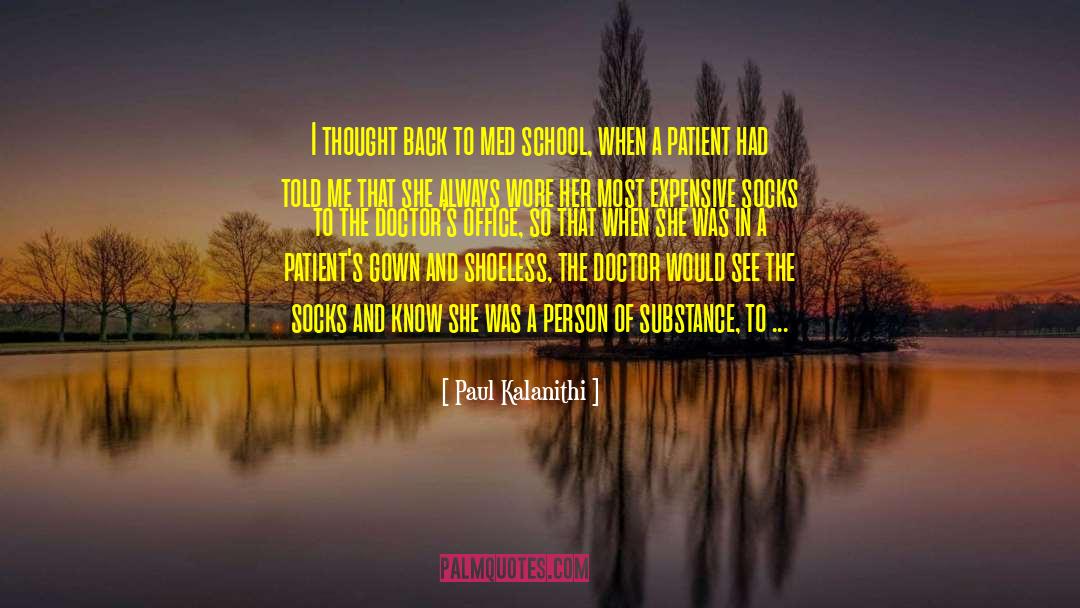
I had to help those families understand that the person they knew - the full, vital independent human - now lived only in the past and that I needed their input to understand what sort of future he or she would want: an easy death or to be strung between bags of fluids going in, others coming out,
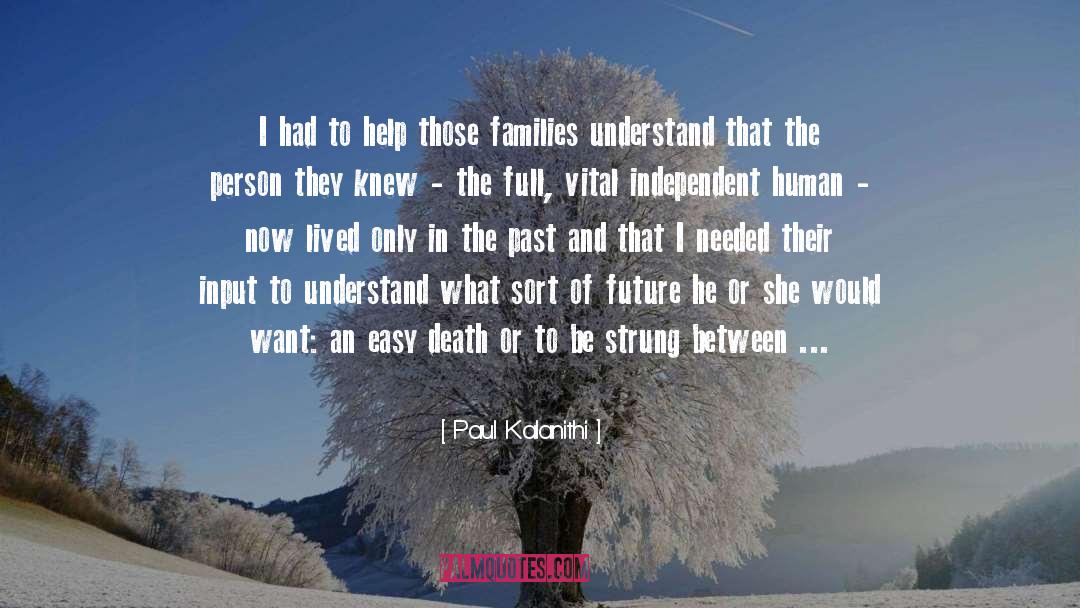
Learning to judge whose lives could be saved, whose couldn't be, and whose shouldn't be requires an unattainable prognostic ability.
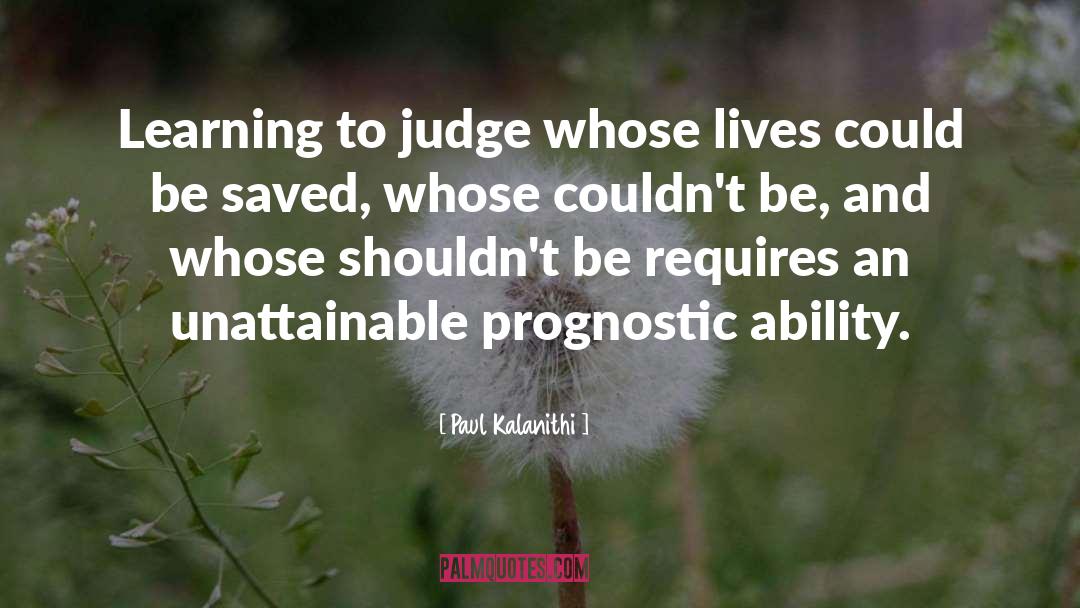
It's easier when the patient is ninety-four, in the last stages of dementia, with a severe brain bleed. But for someone like me - a thirty-six-year-old given a diagnosis of terminal cancer - there aren't really words.
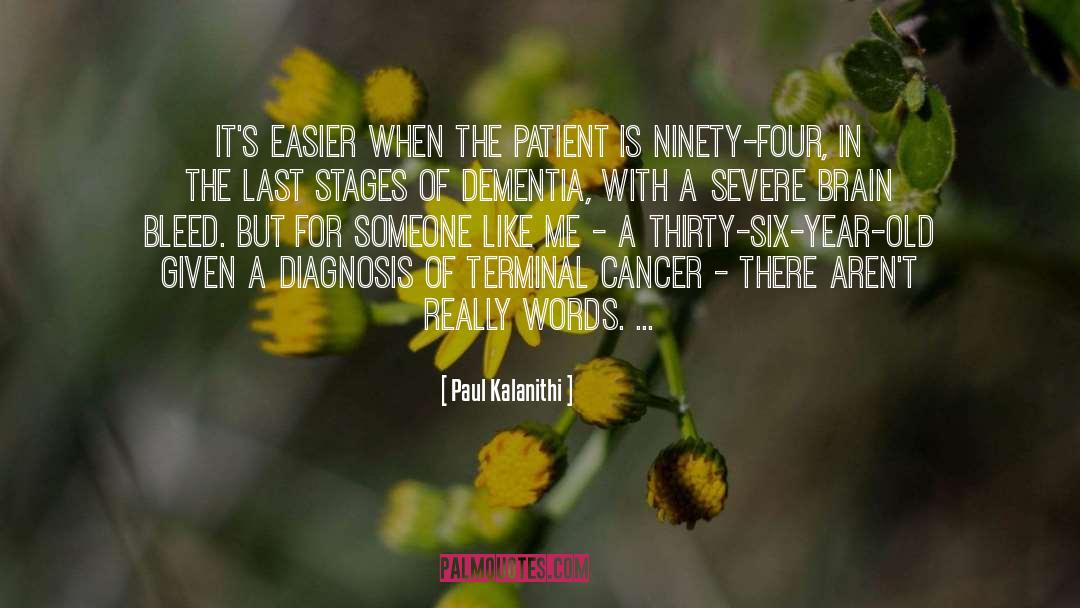
He knew he would never be alone, never suffer unnecessarily. At home in bed a few weeks before he died, I asked him, "Can you breathe okay with my head on your chest like this?" His answer was "It's the only way I know how to breathe." That Paul and I formed part of the deep meaning of each other's lives is one of the greatest blessings that has ever come to me.
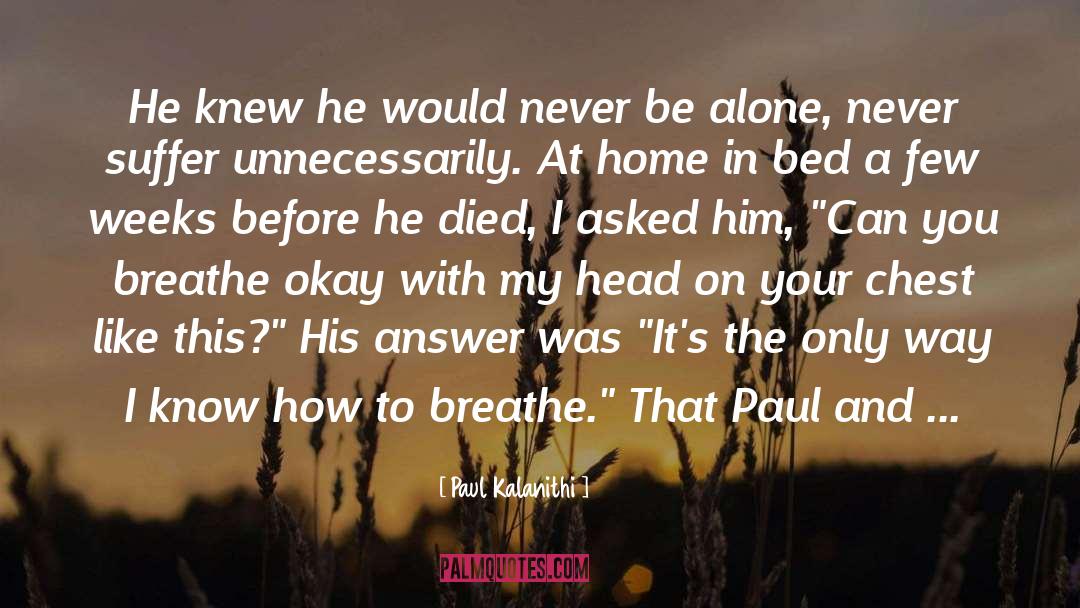
I was caught returning at dawn from one such late-night escapade, my worried mother thoroughly interrogated me regarding every drug teenagers take, never suspecting that the most intoxicating thing I'd experienced, by far, was the volume of romantic poetry she'd handed me the previous week. Books became my closest confidants, finely ground lenses providing new views of the world. In
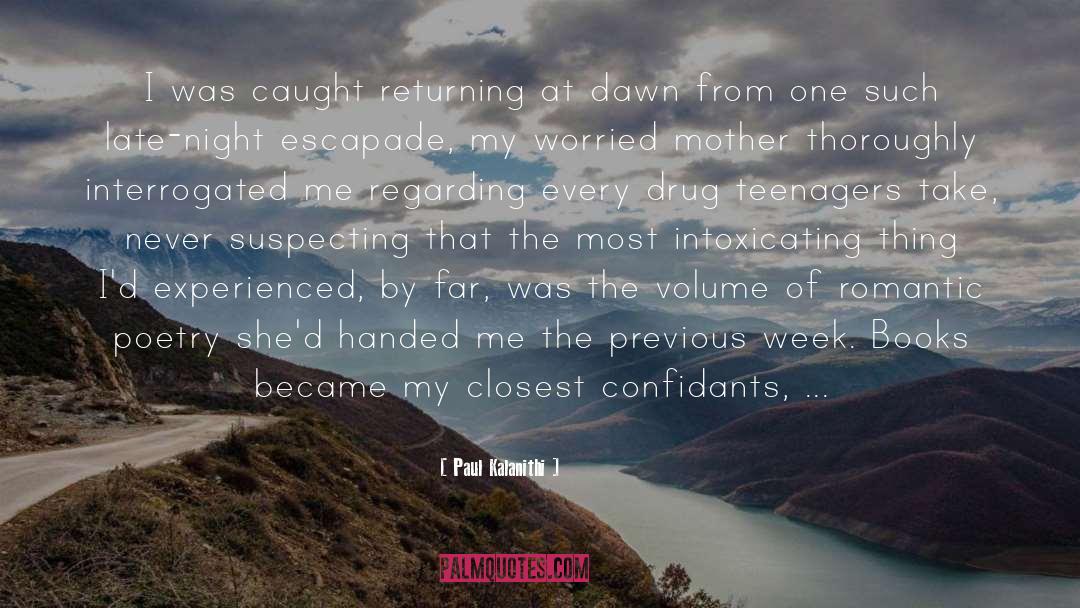
If the weight of mortality does not grow lighter, does it at least get more familiar?
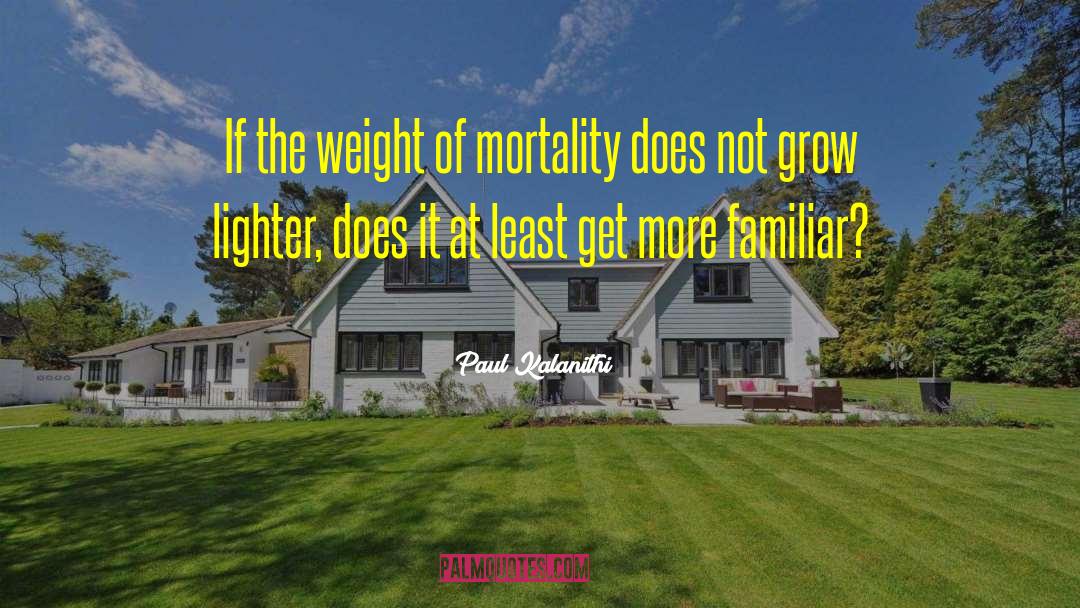
Struggle toward the capital-T Truth, but recognize that the task is impossible - or that if a correct answer is possible, verification certainly is impossible.
In the end, it cannot be doubted that each of us can see only a part of the picture. The doctor sees one, the patient another, the engineer a third, the economist a fourth, the pearl diver a fifth, the alcoholic a sixth, the cable guy a seventh, the sheep farmer an eighth, the Indian beggar a ninth, the pastor a tenth. Human knowledge is never contained in one person. It grows from the relationships we create between each other and the world, and still it is never complete. And Truth comes somewhere above all of them, where, as at the end of that Sunday's reading;
the sower and reaper can rejoice together. For here the saying is verified that "One sows and another reaps." I sent you to reap what you have not worked for; others have done the work, and you are sharing the fruits of their work.
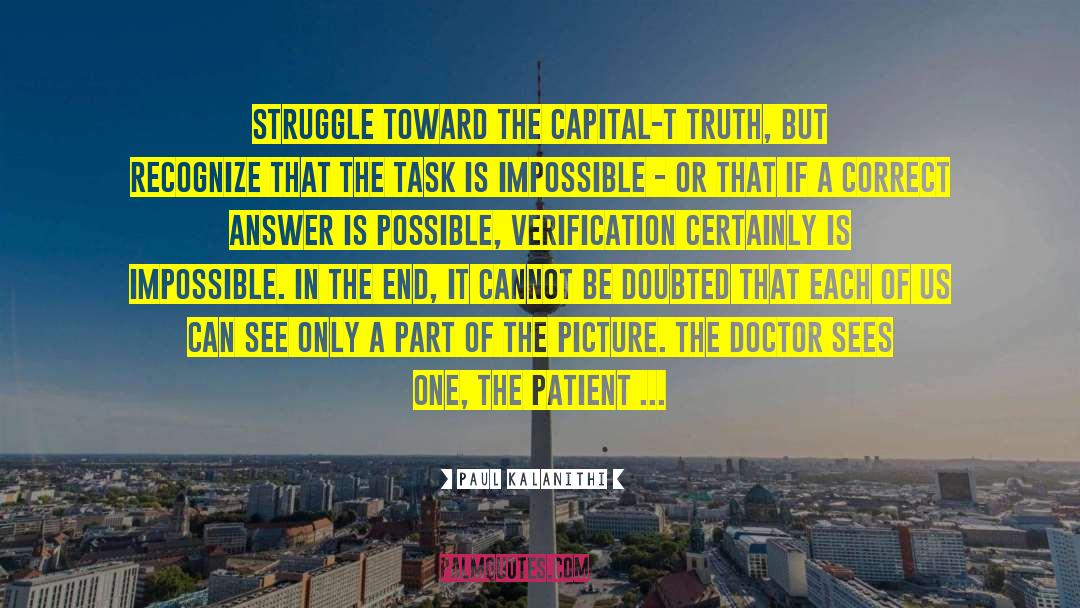
I had passed from the subject to the direct object of every sentence in my life. In fourteenth century philosophy, the word patient simply meant "the object of an action," and I felt like one. As a doctor, I was an agent, a cause; as a patient, I was merely something to which things happened
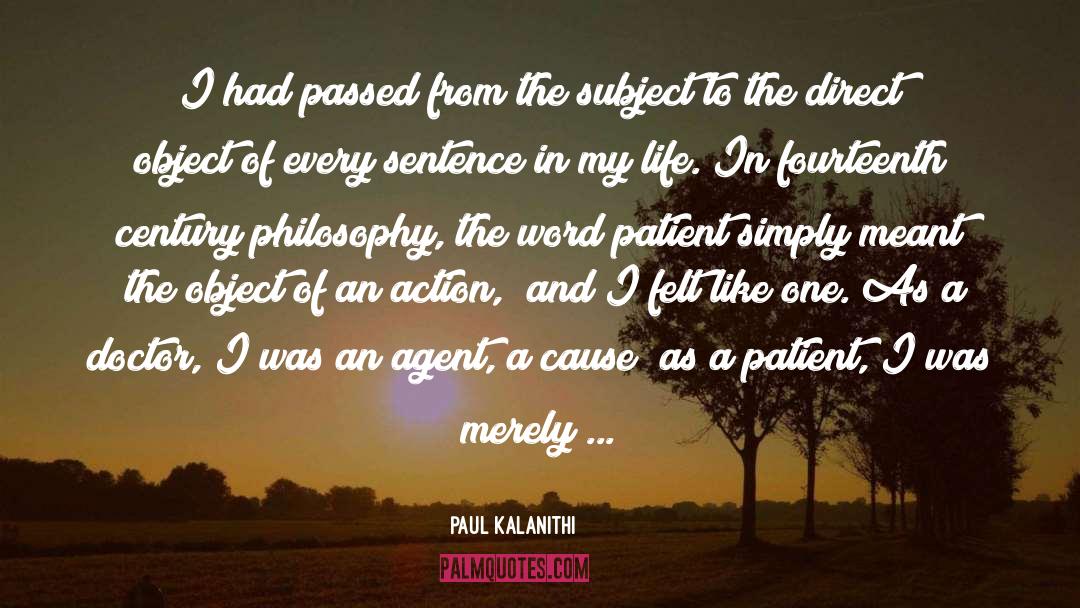
He, uh - he apparently had a difficult complication, and his patient died. Last night he climbed onto the roof of a building and jumped off. I don't really know anything else." I searched for a question to bring understanding. None was forthcoming. I could only imagine the overwhelming guilt, like a tidal wave, that had lifted him up and off that building.
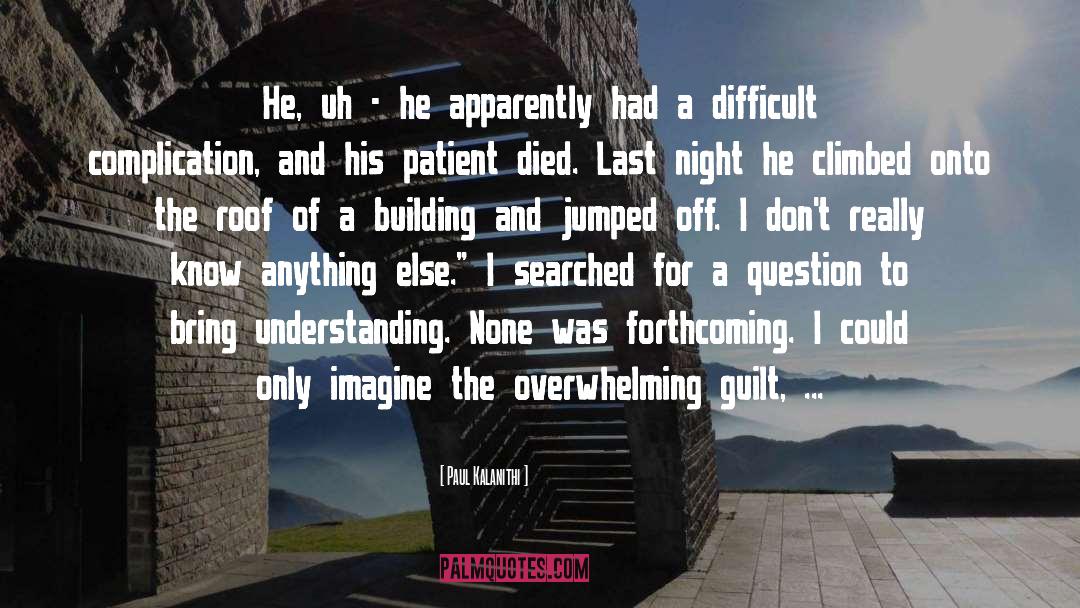
the cruelty of cancer, though, is not only that it limits your time; it also limits your energy, vastly reducing the amount you can squeeze into a day. It is a tired hare who now races. And even if I had the energy, I prefer a more tortoiselike approach. I plod, I ponder. Some days, I simply persist. If time dilates when one moves at high speeds, does it contract when one moves barely at all? It must: the days have shortened considerably. With little to distinguish one day from the next,
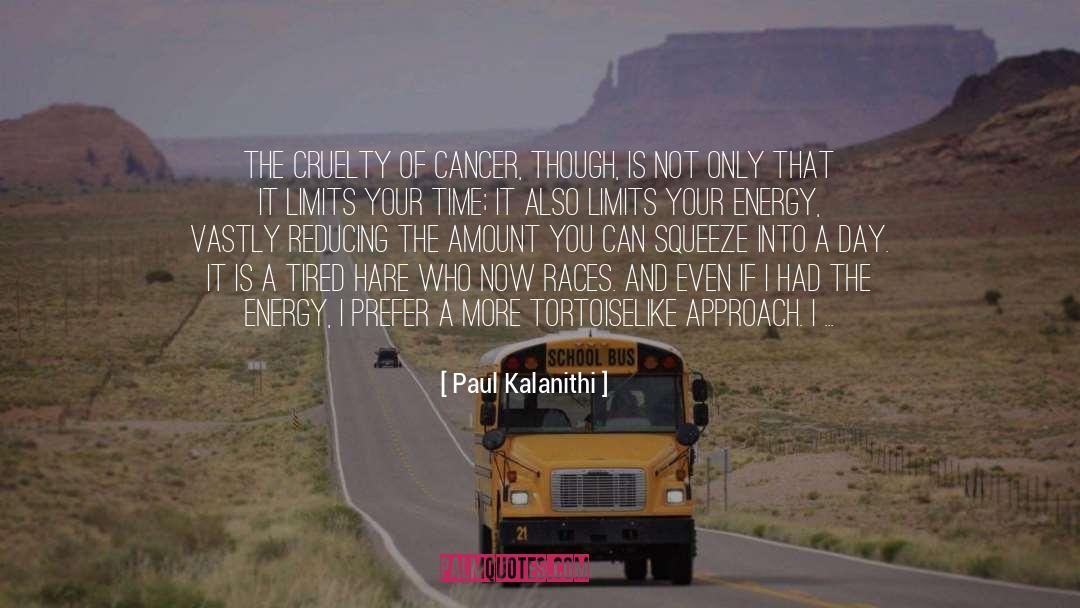
I was leaving this small Arizona town in a few weeks, and I felt less like someone preparing to climb a career ladder than a buzzing electron about to achieve escape velocity, flinging out into a strange and sparkling universe.
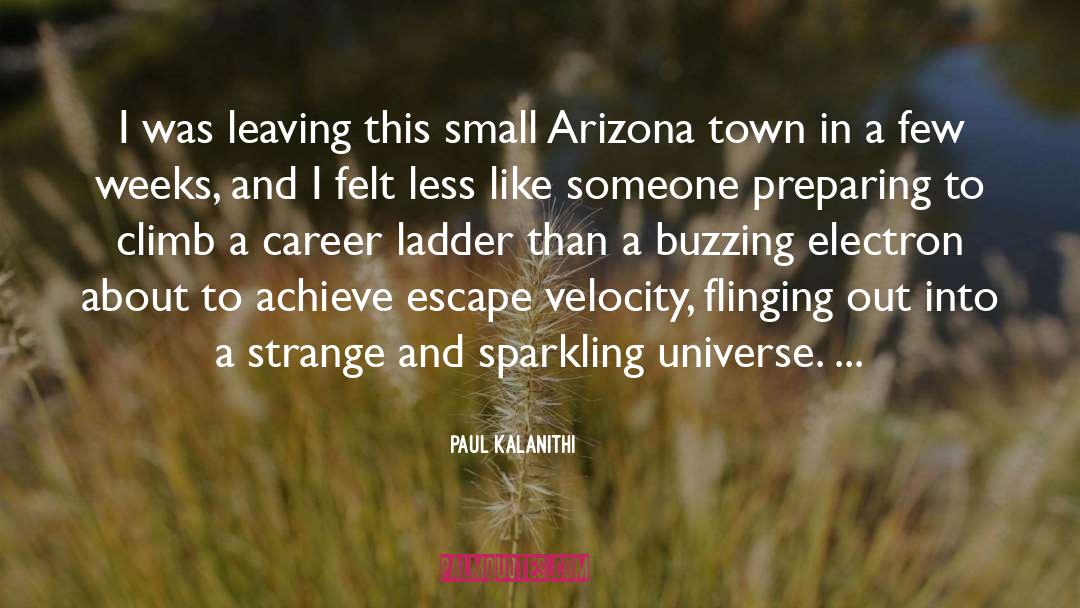
Yet there is dynamism in our house. Day to day, week to week, Cady blossoms: a first grasp, a first smile, a first laugh. Her pediatrician regularly records her growth on charts, tick marks indicating her progress over time. A brightening newness surrounds her. As she sits in my lap smiling, enthralled by my tuneless singing, an incandescence lights the room. Time for me is now double-edged: every day brings me further from the low of my last relapse but closer to the next recurrence - and, eventually, death. Perhaps later than I think, but certainly sooner than I desire. There are, I imagine, two responses to that realization. The most obvious might be an impulse to frantic activity: to "live life to its fullest," to travel, to dine, to achieve a host of neglected ambitions. Part of the cruelty of cancer, though, is not only that it limits your time; it also limits your energy, vastly reducing the amount you can squeeze into a day. It is a tired hare who now races. And even if I had the energy, I prefer a more tortoiselike approach. I plod, I ponder. Some days, I simply persist. If time dilates when one moves at high speeds, does it contract when one moves barely at all? It must: the days have shortened considerably. With little to distinguish one day from the next, time has begun to feel static. In English, we use the word time in different ways: "The time is two forty-five" versus "I'm going through a tough time." These days, time feels less like the ticking clock and more
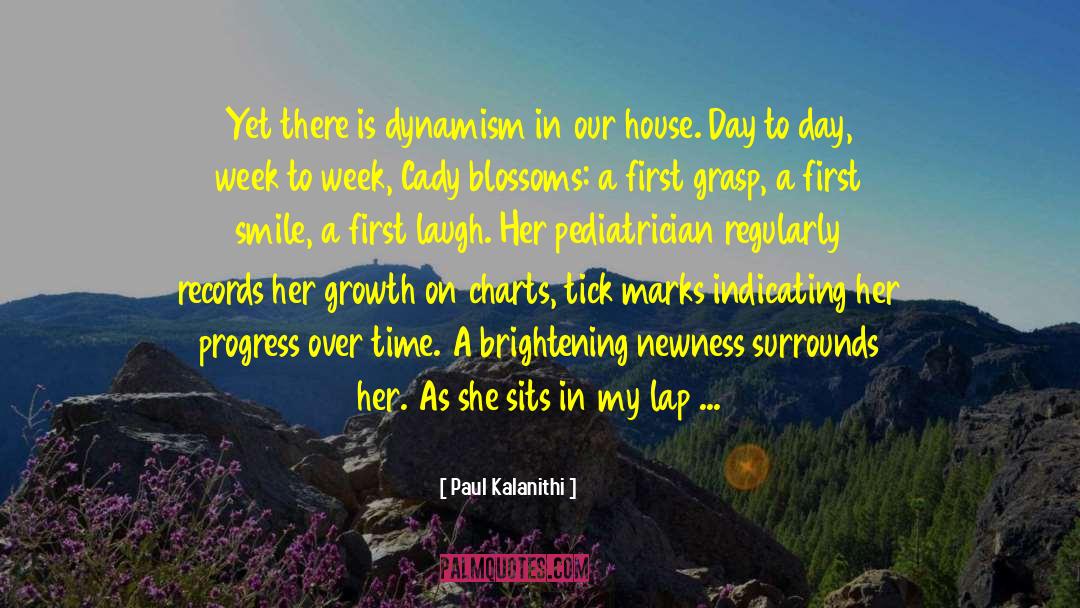
What kind of life exists without language?
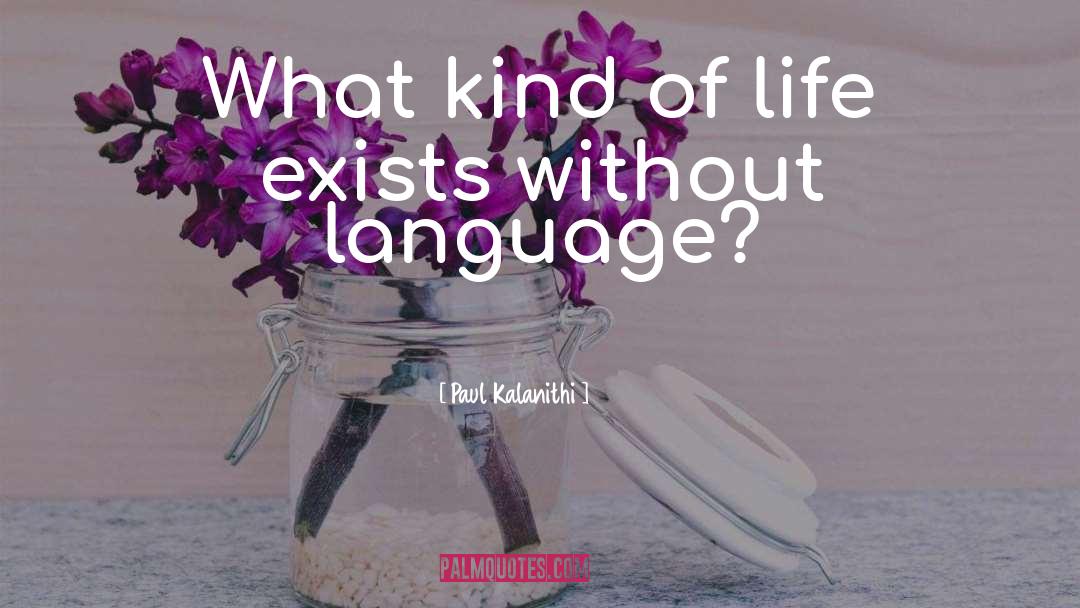
The physician's duty is not to stave off death or return patients to their old lives, but to take into our arms a patient and family whose lives have disintegrated and work until they can stand back up and face, and make sense of, their own existence.
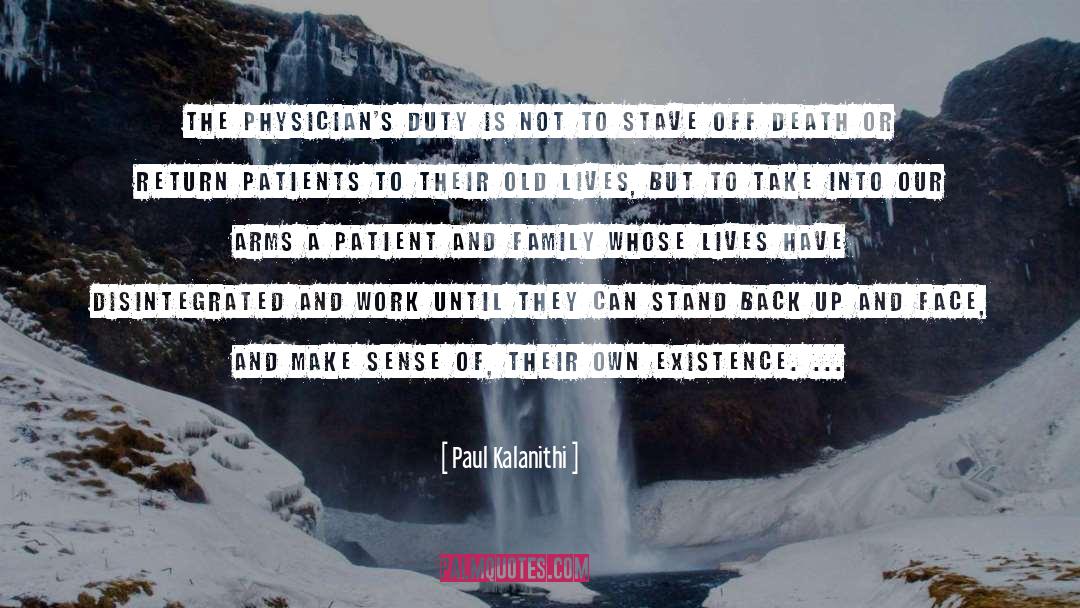
At those critical junctures, the question is not simply whether to live or die but what kind of life is worth living.
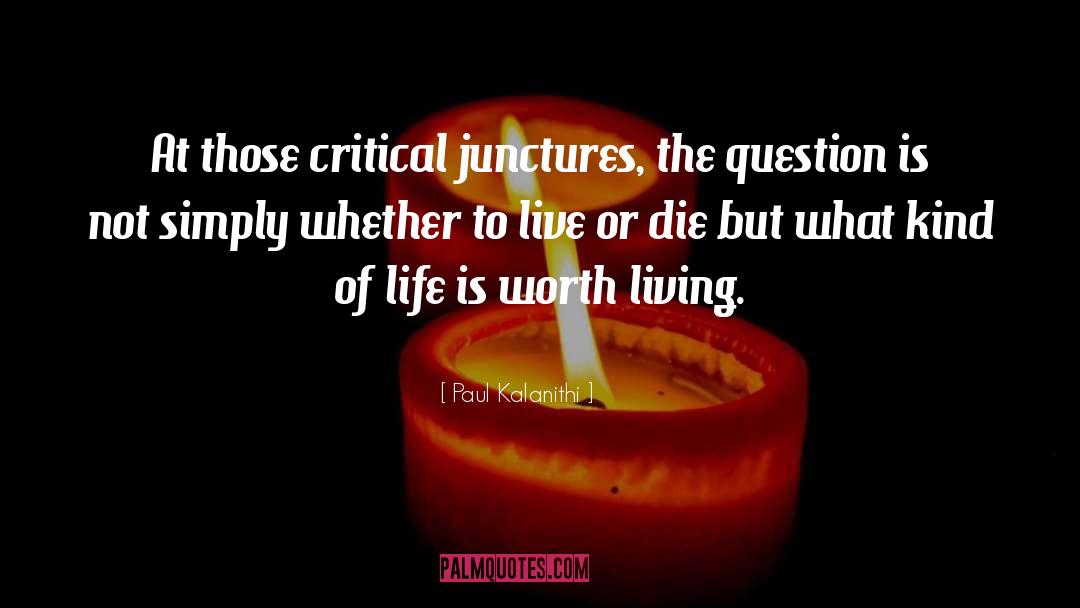
a family will visit constantly, daily or even twice a day. Then maybe every other day. Then just weekends. After months or years, the visits taper off, until it's just, say, birthdays and Christmas. Eventually, most families move away, as far as they can get.
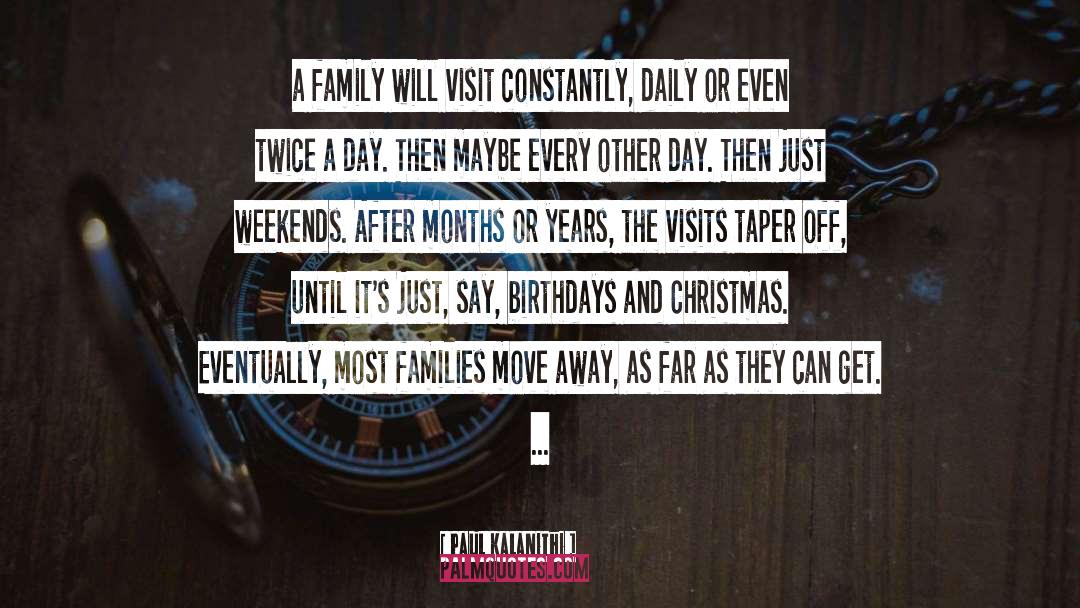
Words have a longevity I do not.
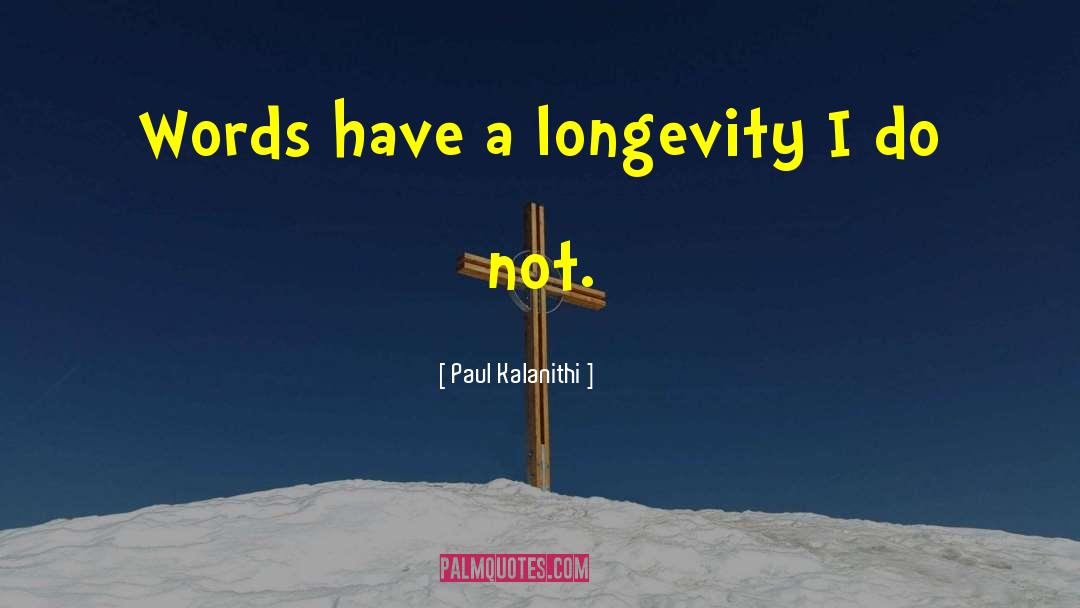
The funny thing about time in the OR, whether you race frenetically or proceed steadily, is that you have no sense of it passing. If boredom is, as Heidegger argued, the awareness of time passing, then surgery felt like the opposite: the intense focus made the arms of the clock seem arbitrarily placed.
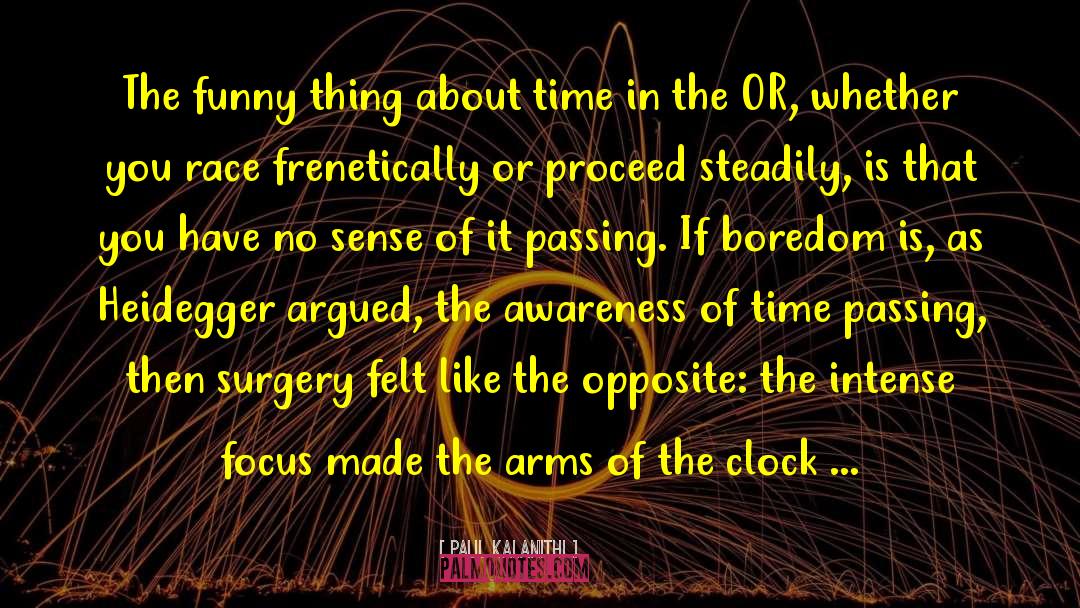
[H]e found poetry more comforting than Scripture - and his ability to forge from his life a cogent, powerful tale of living with death.
![Paul Kalanithi Quotes: [H]e found poetry more comforting Paul Kalanithi Quotes: [H]e found poetry more comforting](https://palmquotes.com/author/paul-kalanithi-quotes-1284441.jpg)
Dying in one's fourth decade is unusual now, but dying is not. "The thing about lung cancer is that it's not exotic," Paul wrote in an email to his best friend, Robin. "The reader can get into these shoes, walk a bit, and say, 'So that's what it looks like from here. Sooner or later, I'll be back here in my own shoes.' That's what I'm aiming for, I think. Not the sensationalism of dying and not the exhortations to gather rosebuds but: Here's what lies up ahead on the road." Of course, he did more than just describe the terrain. He traversed it bravely.
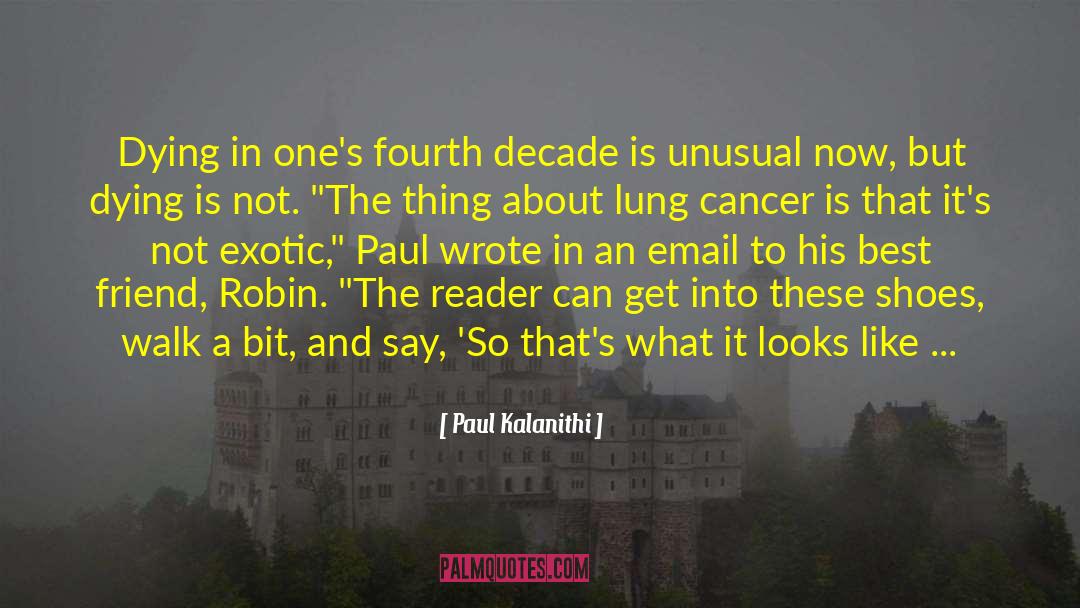
The morning commuters began to animate the distant South Lake Tahoe roads. But craning your head back, you could see the day's blue darken halfway across the sky, and to the west, the night remained yet unconquered - pitch-black, stars in full glimmer, the full moon still pinned in the sky. To the east, the full light of day beamed toward you; to the west, night reigned with no hint of surrender. No philosopher can explain the sublime better than this, standing between day and night. It was as if this were the moment God said, "Let there be light!" You could not help but feel your specklike existence against the immensity of the mountain, the earth, the universe, and yet still feel your own two feet on the talus, reaffirming your presence amid the grandeur.
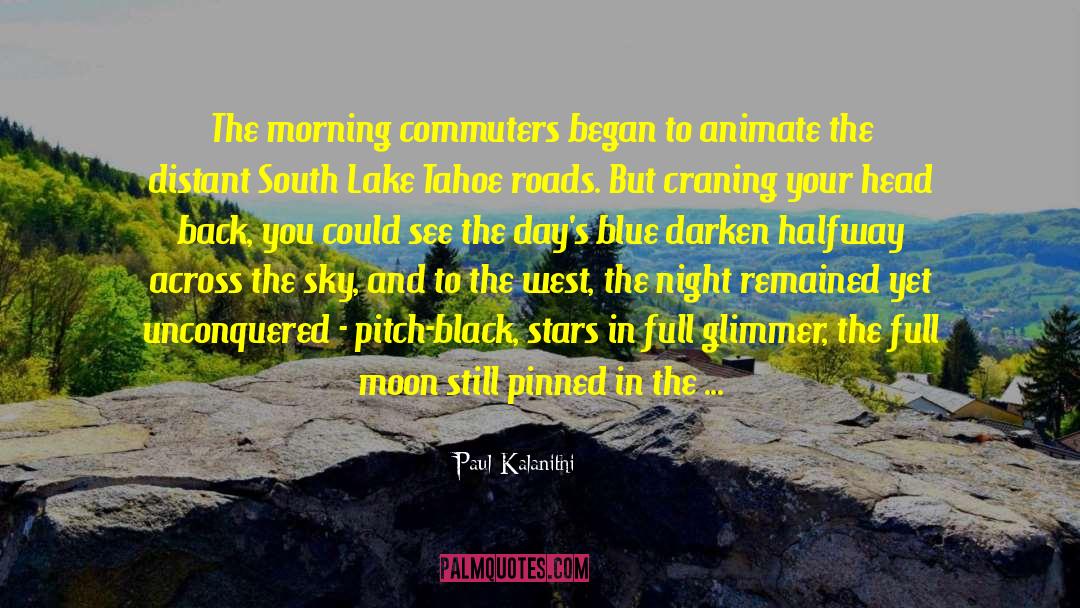
Will having a newborn distract from the time we have together?" she asked. "Don't you think saying goodbye to your child will make your death more painful?"
"Wouldn't it be great if it did?" I said. Lucy and I both felt that life wasn't about avoiding suffering.
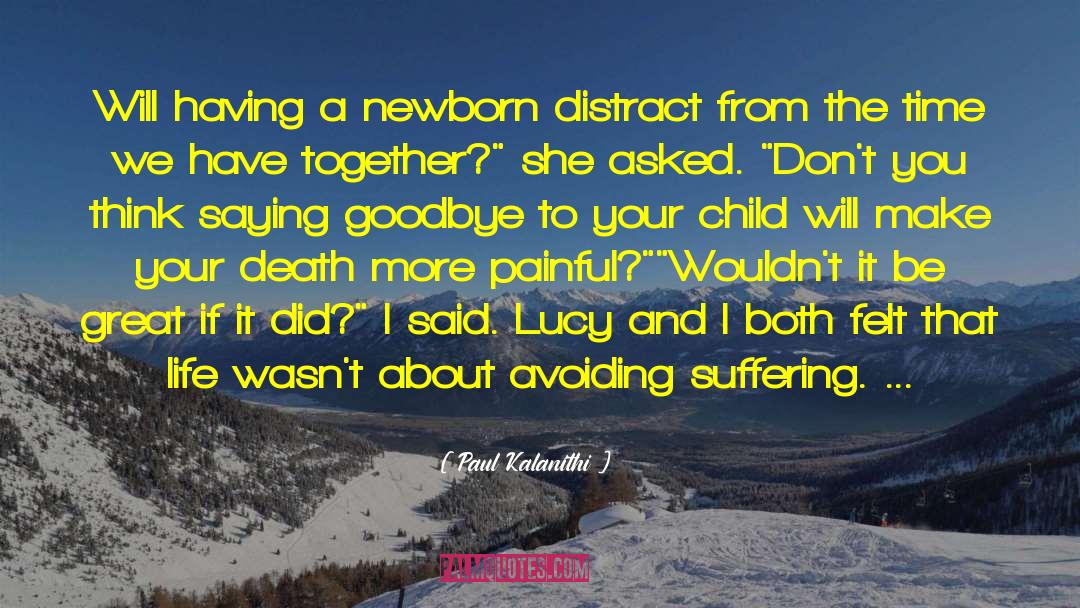
Literature provided a rich account of human meaning; the brain, then, was the machinery that somehow enabled it. It seemed like magic.
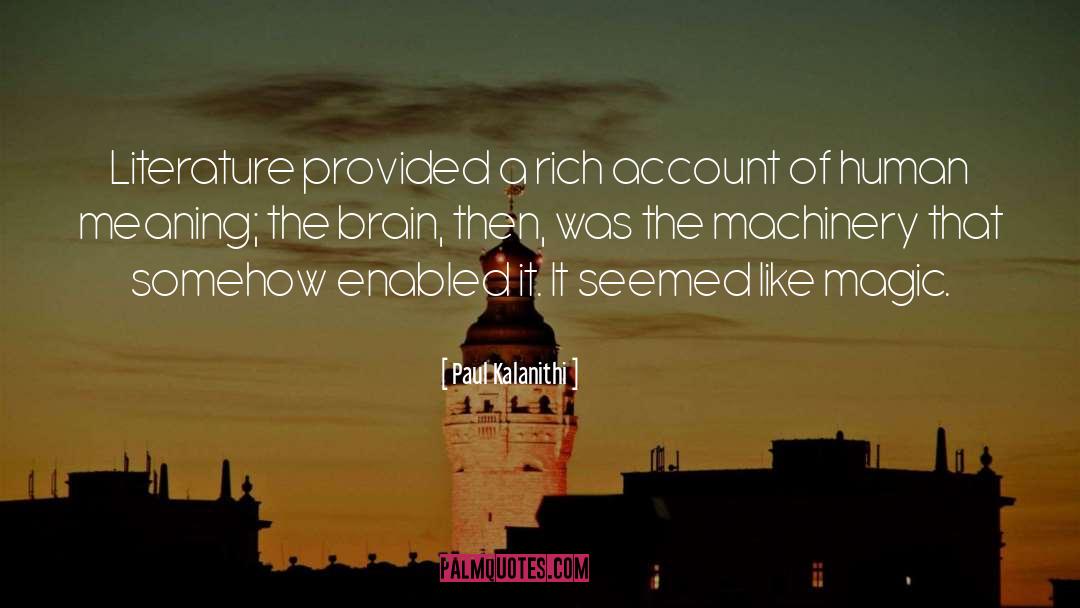
The MRI shows a mass in your brain, which is causing your symptoms." Silence. "Do you want to see the MRI?" "Yes." I
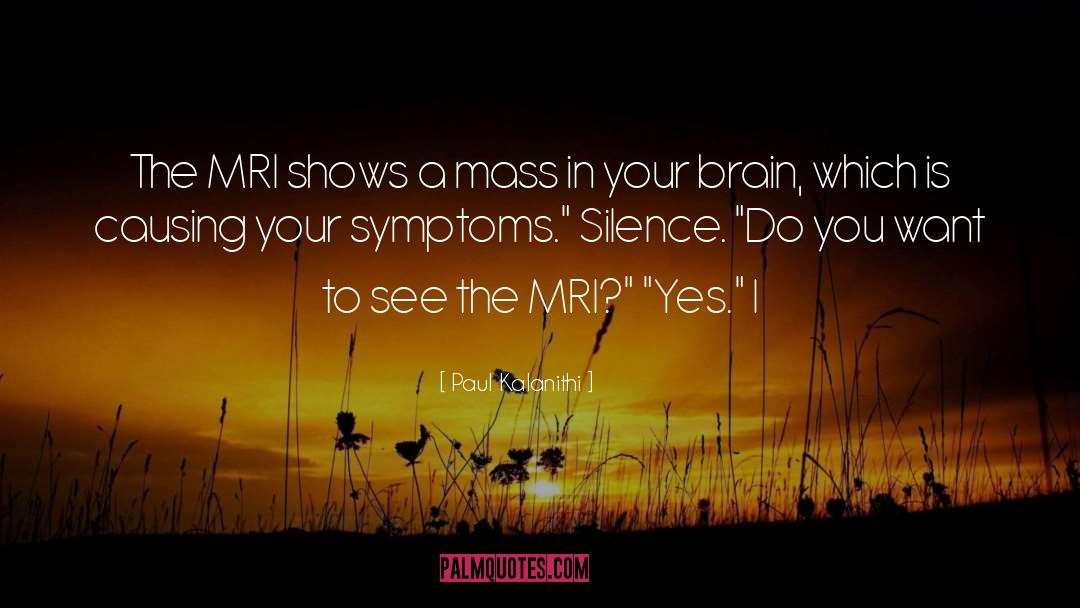
As graduation loomed, I had a nagging sense that there was still far too much unresolved for me, that I wasn't done studying. I applied for a master's in English literature at Stanford and was accepted into the program. I had come to see language as an almost supernatural force, existing between people, bringing our brains, shielded in centimeter-thick skulls, into communion. A word meant something only between people, and life's meaning, its virtue, had something to do with the depth of the relationships we form. It was the relational aspect of humans - i.e., "human relationality" - that undergirded meaning. Yet somehow, this process existed in brains and bodies, subject to their own physiologic imperatives, prone to breaking and failing. There must be a way, I thought, that the language of life as experienced - of passion, of hunger, of love - bore some relationship, however convoluted, to the language of neurons, digestive tracts, and heartbeats. At Stanford, I had the good
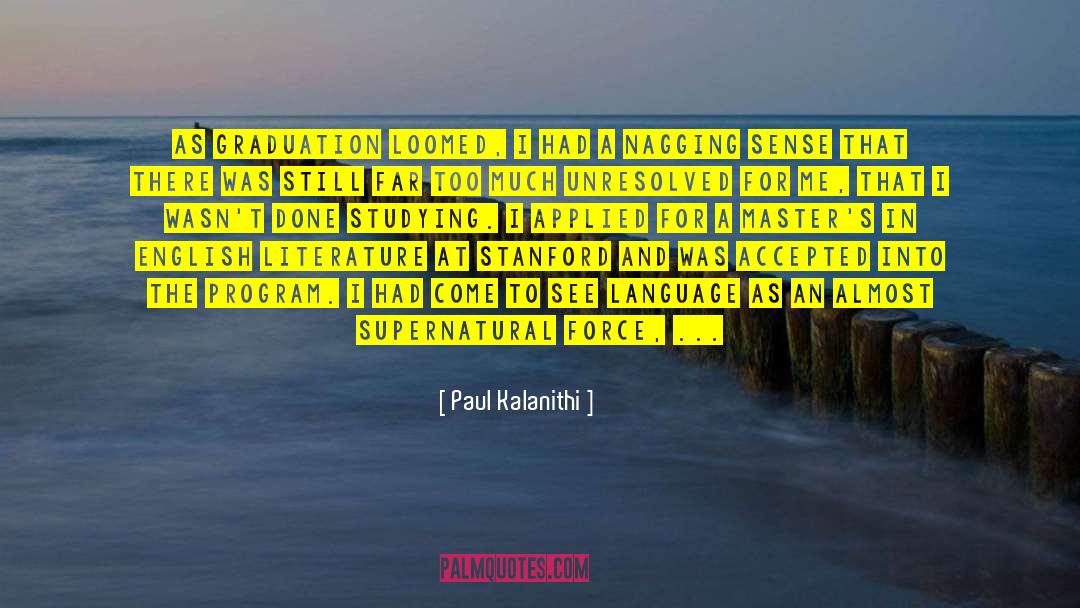
I still had a lot of practical medicine to learn, but would knowledge alone be enough, with life and death hanging in the balance? Surely intelligence wasn't enough; moral clarity was needed as well. Somehow, I had to believe, I would gain not only knowledge but wisdom, too.
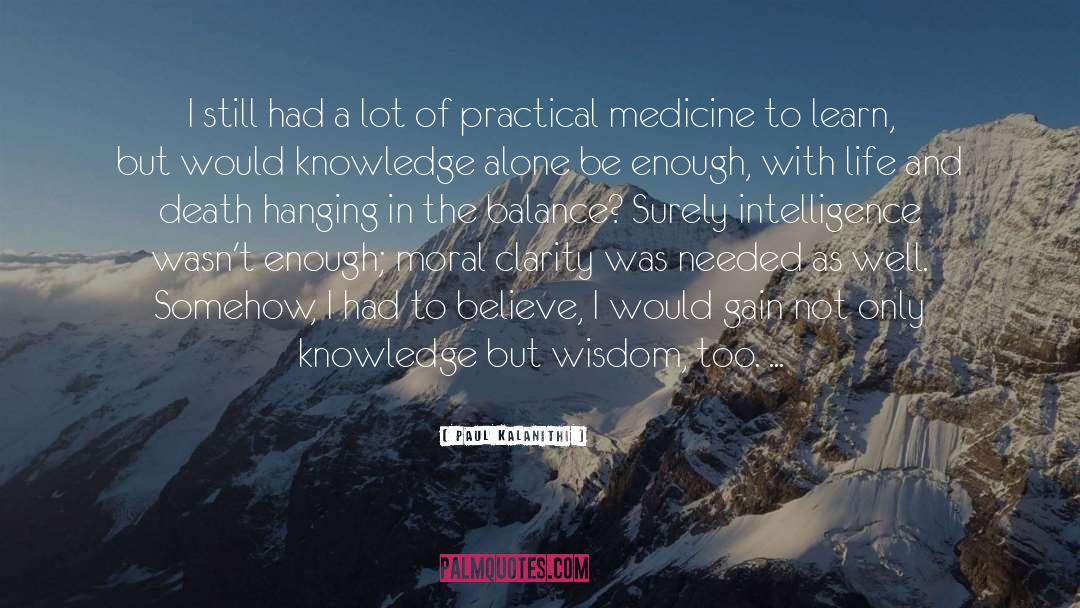
There is a moment, a cusp, when the sum of gathered experience is worn down by the details of living. We are never so wise as when we live in this moment.
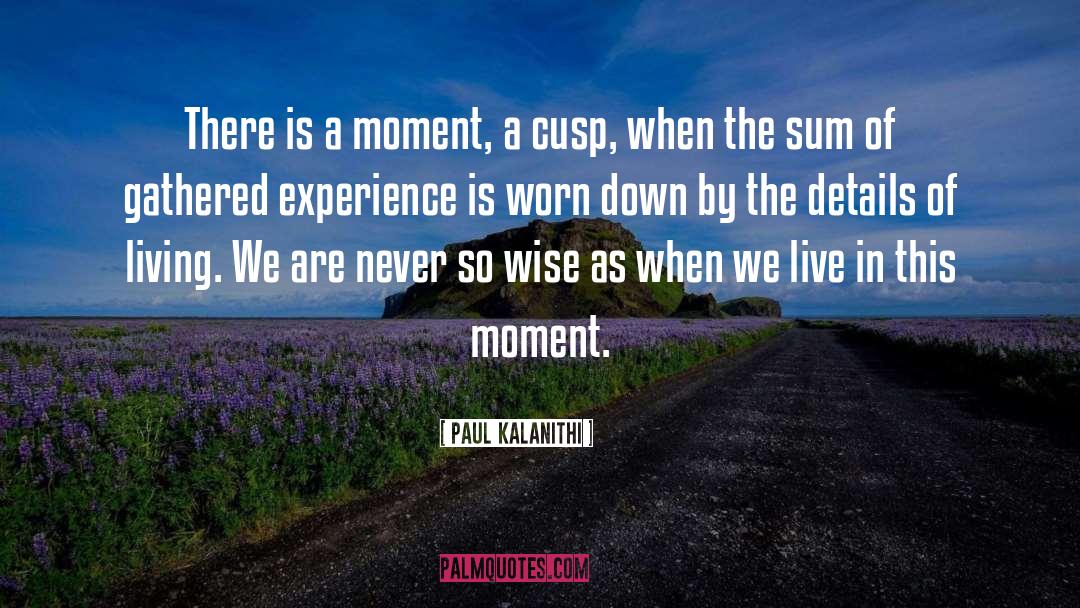
The most obvious might be an impulse to frantic activity: to "live life to its fullest," to travel, to dine, to achieve a host of neglected ambitions. Part of the cruelty of cancer, though, is not only that it limits your time; it also limits your energy, vastly reducing the amount you can squeeze into a day. It is a tired hare who now races. And even if I had the energy, I prefer a more tortoiselike approach. I plod, I ponder. Some days, I simply persist.
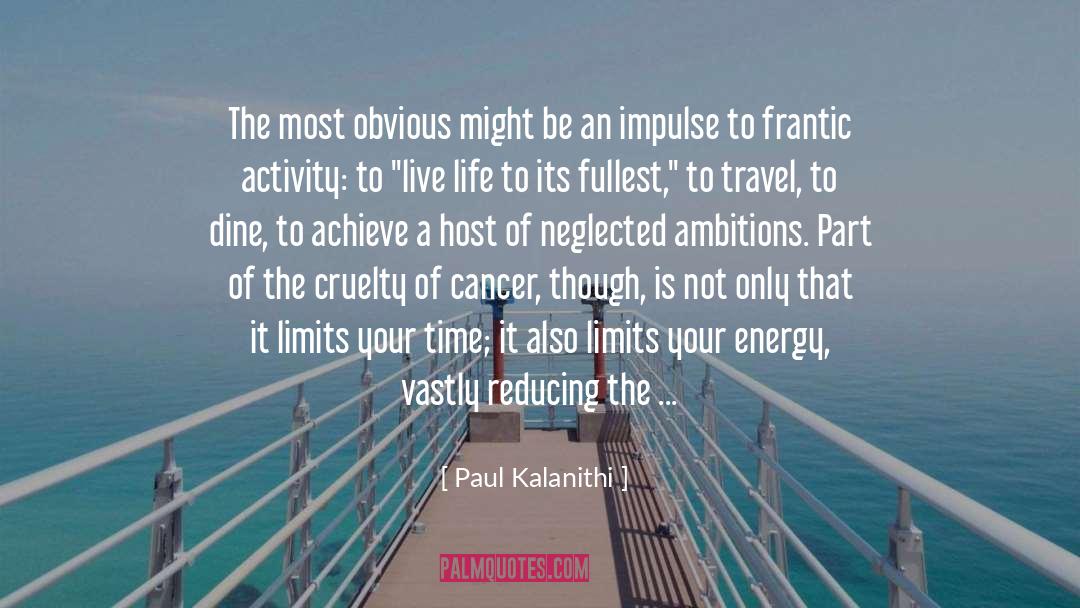
(Alexander Pope: "A little learning is a dangerous thing; / Drink deep, or taste not the Pierian spring.")
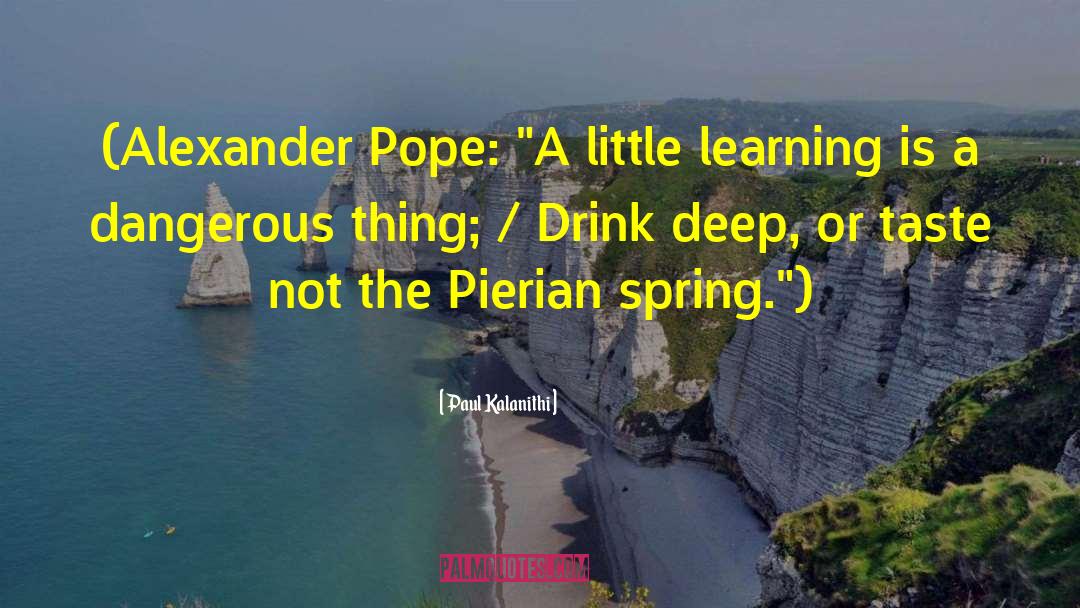
the heroic spirit of responsibility amid blood and failure. This struck me as the true image of a doctor.
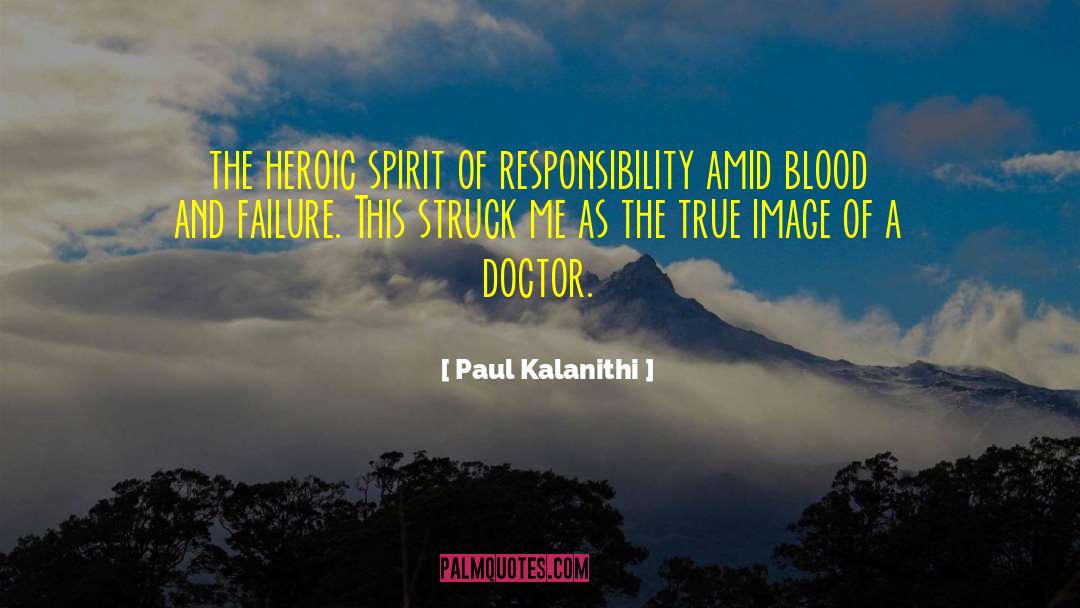
Getting too deeply into statistics is like trying to quench a thirst with salty water.
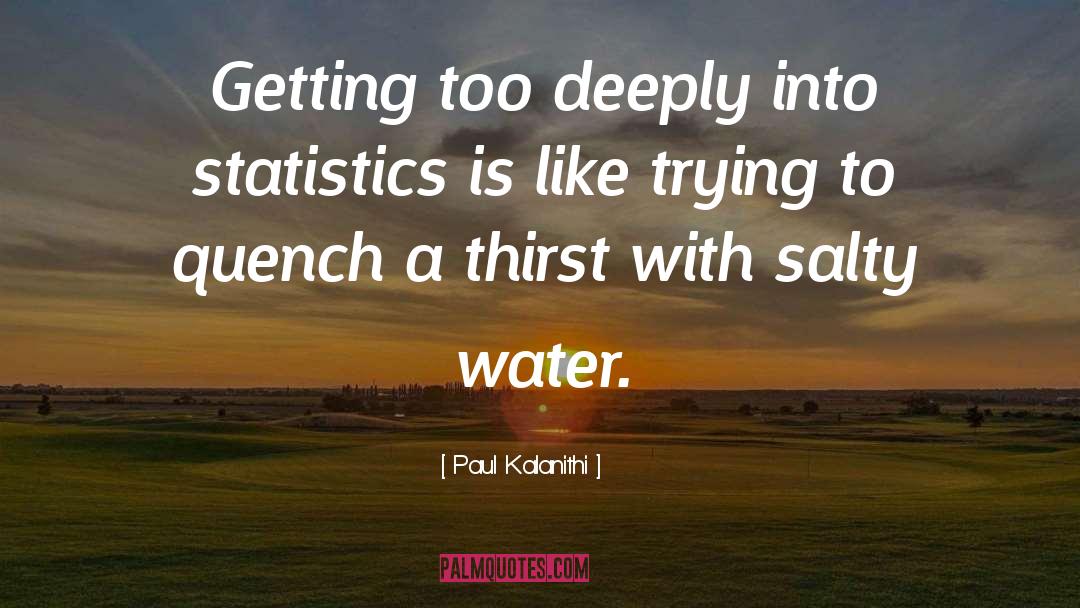
You can't ever reach perfection, but you can believe in an asymptote toward which you are ceaselessly striving.
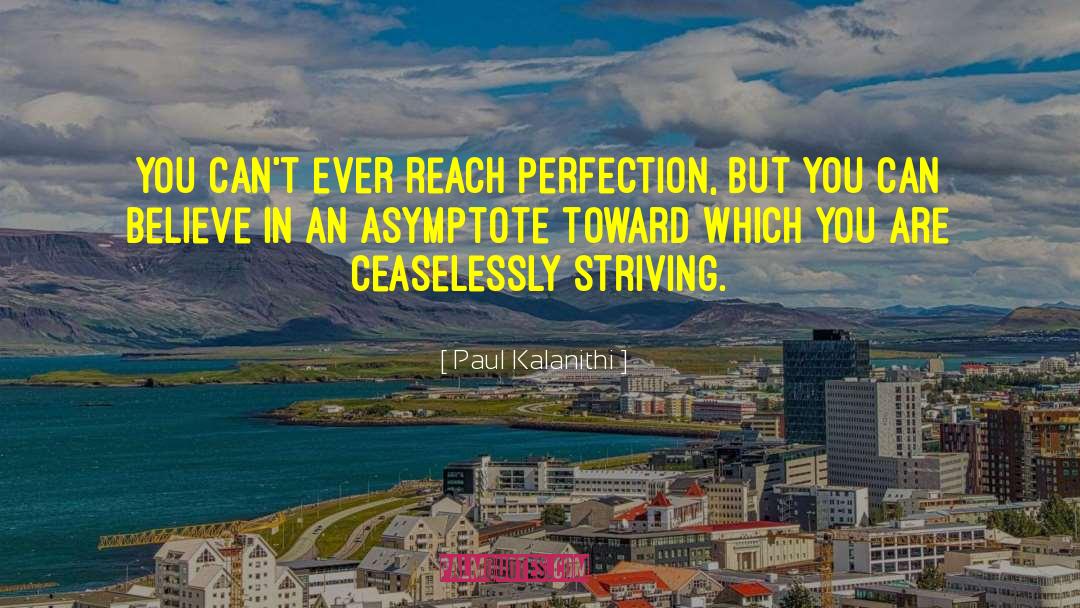
values of Christianity - sacrifice, redemption, forgiveness - because
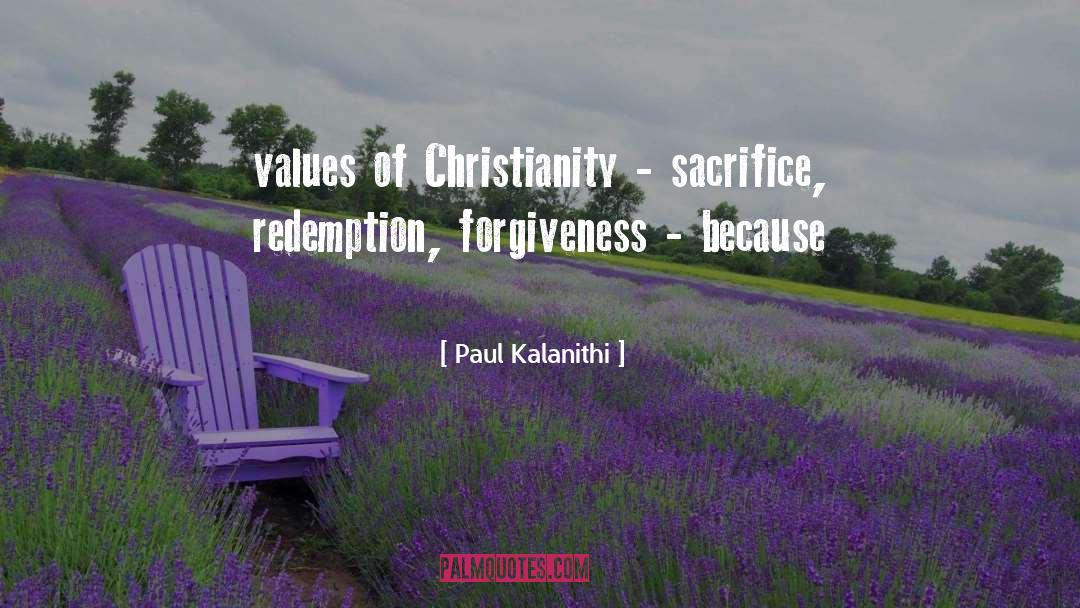
In the end, it cannot be doubted that each of us can see only a part of the picture. The doctor sees one, the patient another, the engineer a third, the economist a fourth, the pearl diver a fifth, the alcoholic a sixth, the cable guy a seventh, the sheep farmer an eighth, the Indian beggar a ninth, the pastor a tenth. Human knowledge is never contained in one person. It grows from the relationships we create between each other and the world, and still it is never complete. And Truth comes somewhere above all of them, where,
